

Travel Baseball: The Ultimate Guide for Parents and Players

Table of Contents
What is travel baseball, what to look for in a travel baseball team, travel baseball vs. little league, travel baseball pros and cons , criticisms and controversy, is travel baseball worth it.
For many families, the transition from Little League to travel baseball comes with stress, anxiety and questions about what to look for in a team and what to expect from the experience — not to mention the question of whether making the switch from a more laid-back rec ball program to a more competitive (and expensive) travel club is the right decision in the first place.
In this post, we’re going to go over everything you need to know about getting started with youth travel baseball. We’ll help you answer the questions above and determine whether travel baseball is a good fit for your son or daughter.
If you have a softball player in the family, you may also want to check out our article “ What to Look For in a Travel Softball Team ,” which covers some of the same information from a softball perspective and dives deep into my personal experience as an elite-level amateur player and college recruiting prospect.
Table of Contents :
- How to Choose a Travel Baseball Team
- Travel Baseball Pros and Cons
- Is Travel Baseball Worth It?
First, it’s important to understand what a travel baseball team is and how travel baseball is organized.
There are tens of thousands of travel baseball teams around the country, and their popularity has exploded over the past two decades. As recently as the 1990s, travel baseball was a niche experience limited mostly to elite players in baseball-rich areas like Texas and California. Today, participation is seen by many as a near necessity for talented players to develop their skills and hone their game against the best competition they can find.
Whereas Little League is the dominant organization when it comes to recreational youth baseball, there are multiple organizations throughout the country that host hundreds of travel tournaments each year. Some of the biggest and most popular are USSSA (United States Speciality Sports Association), AAU (Amateur Athletic Union), Triple Crown Sports , and Perfect Game . Travel baseball teams often participate in tournaments organized by more than one of those organizations.
A team can be started by anyone. Many are formed by parents, but many others are formed by high school and former college coaches. Depending on their organizational goals, some programs have just one team that participates in one age bracket (such as 10 and under), while some are run like businesses and have teams that compete in every age group.
Some huge organizations, such as California Baseball Academy (CBA), even have multiple teams within the same age group, located in multiple cities. CBA has teams not only in California, but also in Nevada, Texas, Utah and the southeast. High-level programs like that are often known for attracting top talent, for training recruits into elite players, and for feeding those players into nearby colleges and universities.
Travel Baseball Competition Structure
Virtually all travel baseball games are played on weekends in a tournament format. Those tournaments can theoretically be held anywhere, but are frequently held at multi-field facilities in easily-accessible travel hubs. For example, many Florida tournaments are held in Orlando because it’s in the relative center of the state, it has plenty of hotel rooms, and it’s home to many great baseball facilities. The farther you live away from such a hub, the more you should expect to travel.
Most tournaments begin with pool play, meaning that teams are guaranteed a number of games before heading into single elimination. A team can expect to play anywhere from three to eight games over the course of a two-day or three-day tournament, depending on how they perform.
There is no set number of tournaments a team must participate in. Each team decides which tournaments to enter on a case-by-case basis, taking into consideration factors such as age level, skill level, and cost. In general, two tournaments per month can be seen as about average, although higher-level teams may play more frequently.
Most organizations run regional and national championships, which are invite-only. For example, USSSA hosts “qualifier” tournaments, where the winner of the championship game (and sometimes the runner up) can earn a bid to the USSSA national tournament.
Additionally, beginning at age 14, some teams start participating in “college exposure tournaments,” where college scouts come from across the country to watch and evaluate prospects. These tournaments are typically more expensive than regular tournaments, and are often farther away.
How to Join a Travel Baseball Team
If you’ve decided to join a travel baseball team and aren’t sure where to find one, there are a number of resources available.
It may go without saying, but word-of-mouth can be a valuable first reference point. If you’re thinking about switching to travel baseball, chances are that you already know someone in your area who has made the jump. If so, don’t be afraid to ask them questions about the team and their experience. It’s a big commitment — both in terms of time and finances — so it’s important to make sure you find the right club for your son or daughter.
In addition to word of mouth, many organizations offer a list of active teams on their website. For example, USSSA has a tool that lets you filter teams by age level, skill level, and location . There are also many state-based forums and Facebook groups where coaches post their team’s tryouts (and positions needed). As an example, here are Facebook groups for travel baseball teams in Florida and Michigan — you can find similar groups for every state.
Another good option is FieldLevel.com , which (like the USSSA site) allows you to filter teams by state and level. While not every team is listed on that website, it does include over 4,000 clubs.
Here are eight things to think about when evaluating teams. These factors will make a big difference when it comes to your overall experience, so take the time to think about them, and don’t be afraid to ask questions of parents and coaches.
1. Coaching
A coaching staff can make or break a team. How coaches manage players, keep the game fun, instill the fundamentals, and focus on development — not only as athletes, but as young men and women — is extremely important.
Some travel baseball teams have parents or grandparents serving as the head coach. While that can be fine, it’s important to make sure those coaches don’t make keeping their own child on the field a priority. Before committing to a team, spend some time researching it by watching a practice and talking to current and/or former players and parents.
What’s the coaching style? Do they have high expectations but still encourage and love their players? Or, on the other hand, are they screaming at players when they make a mistake?
Additionally, are players treated equitably, or do some get preferential treatment based on their relationship to the coach or their financial contribution to the team?
Ideally, your child will be a part of that team and organization for consecutive years, rather than bouncing from team to team. As such, determining whether the coaching staff is a good fit is a crucial first step.
2. Cost
For many parents, this is the most terrifying aspect of travel baseball.
Just how much of a toll is this going to take on your bank account? The specific answer varies, but the typical range of cost for participating in travel baseball is between $500 and $2,500 per year.
That said, you can end up spending a lot more than that. Back in 2011, CBS News reported that one Georgia family paid $4,000 per year for their 9-year-old son’s travel team. You can imagine that older players in elite programs that travel all over the country can spend even more over the course of a season.
Typically, the more intensely focused a program is on developing its players for college baseball, the more money the program is going to cost. On the other hand, teams that are playing more for the fun of it — those looking for just a little more structure and competition than offered by Little League — won’t put as much of a dent in your wallet.
There are a number of specific factors that go into how much it costs to be on a team:
- Where you live . If you live in a baseball hub, like Texas or California, you won’t have to travel as far to get to tournaments. Many teams from rural areas regularly drive across multiple states (or sometimes even fly) to tournaments. As such, where you live will likely be the single biggest variable in your overall travel baseball cost.
- Whether you have to buy your own equipment . Some teams are sponsored by equipment companies like Easton and Rawlings and have their bats, gloves and cleats provided either for free or at a reduced cost. Obviously, this can be a huge savings. Also, keep in mind that (unfortunately) equipment is often viewed as a status symbol in travel baseball. If your child joins a team where every other player has multiple bats and position-specific gloves, he or she is going to press you for similar gear.
- Whether you have to rent facilities . Some teams practice exclusively at public fields. Others have little or no access to such facilities and have to rent fields and/or indoor space (especially for winter workouts). This can have a huge impact on the overall cost of participation.
- Whether or not coaches are paid . Some teams — typically the more competitive ones — pay their coaches small stipends and/or cover their cost of travel. On one hand, this tends to lead to better coaching. On the other hand, families are the ones who will ultimately foot that bill.
- How competitive the team is . Higher-level tournaments typically have higher fees. Lower-level tournaments, operated on a more sub-regional basis, are usually much less expensive to enter. If cost is a concern, make sure you know what types of tournaments the team usually enters over the course of the season.
3. Location
As stated earlier, location is a key factor in deciding which travel team to play for. If you’re fortunate enough to live in California, Florida or Texas, you’re going to have a lot of opportunities to play with and against high-level competition right in your backyard.
But outside of those states, it’s a little bit tougher, and you have to decide how committed you are to playing at the highest possible level.
For example, if you live in a medium-sized town outside of a major baseball hub, chances are you have at least a couple of travel ball options. However, the odds are that those options are not the absolute cream of the crop when it comes to coaching and competitiveness. In order to play for the absolute “best” team possible, you might have to commute from your mid-sized town to the nearest major city.
So you’ll be faced with the following choice: play on a lower level team that’s closer to home, or drive a hundred miles or more for twice-weekly practices? It may sound crazy, but many families do just that.
Why would they commit so much time and money to their son or daughter’s athletic pursuits? It comes down to goals. Better teams often provide better coaching and more opportunities for exposure to college and professional scouts.
What’s the team’s mission? Is the focus on fun, player development, college exposure, or a mix of all there? Teams can have many different goals and missions, and there’s no right or wrong approach.
However, it is possible that a team’s mission does not align with your values and goals, and you need to think about this before committing, as a compatibility mismatch can lead to coach-parent and coach-player tension.
5. Organization
Consider the reputation of the organization you’re evaluating. When you join a team, you and your son or daughter will essentially be endorsing everything the program stands for. If they’re known for dirty play or being disrespectful to the game, you’ll be associated with that.
And believe it or not, the baseball world is a small and surprisingly tight-knit community. College coaches tend to know which programs produce bad apples — and they avoid them. In fact, many college coaches will completely write off an entire organization that has a reputation for not playing the game the right way or for having disrespectful players.
6. Playing Time
There’s an important balance between getting enough playing time and being challenged. Before committing, ask the coaching staff what kind of playing time your child can expect — including at what position.
If there are two returning shortstops, he or she most likely won’t be playing there and might have to learn another position. That’s not a bad thing: college coaches want players that are versatile, and many players change positions as they get older and their bodies develop.
Still, it’s helpful to know what to expect ahead of time. Getting game reps is important from a development perspective, but also just from a fun perspective: no kid wants to consistently travel to a tournament only to sit on the bench for most of the weekend.
7. Skill Level
Be realistic about your child’s skill level, and pay attention to the level of competition around him or her at tryouts (i.e., the skill levels of the other players). If your kid has the fight and desire to compete for a spot (like they’ll have to do if they make it to college ball), then putting them on a team where they’ll be challenged is the best option.
But if he or she is there to have fun and make friends, with no burning desire to be constantly improving, then choosing a travel team that’s more low-key will be the better call.
8. What You’re Giving Up
Travel baseball tournaments are on weekends, and players often have to sacrifice certain things that are part of a normal childhood.
Is your son or daughter willing to miss out on things like birthdays, sleepovers and school dances, because most of their time is spent doing homework, traveling to and from games and practices, practicing on their own (possibly including private lessons), and spending nearly every summer weekend at the ballpark?
And are they willing to sacrifice the material things that matter to kids — things like clothes, video games, new smartphones, etc. — because so much money is being spent on baseball?
As I wrote in THV’s guide to travel softball , my family made major sacrifices to support my athletic pursuits.
For some, their love of the game is so great that giving up these things is a no-brainer. For others, they may regret missing out on these social activities. And that’s perfectly fine! Just be honest with each other and talk about the true costs of travel baseball — because it’s not just the sticker price.
There are some important similarities and differences between competitive travel baseball and recreational baseball. Both can teach many valuable life skills, such as work ethic, good sportsmanship, teamwork and bouncing back from failure. But they are very different when it comes to time commitment and competitiveness.
The Little League schedule usually runs from the late spring through early summer, with teams practicing twice per week and playing two games per week. The total number of games per season varies, but it usually ranges from 10 to 20. It’s a local program, which means travel is either limited or non-existent. In general, Little League coaches are parents.
Little League can be a great place for kids as young as 4-years-old to start playing the game. They’ll learn the rules and the absolute basics of hitting, pitching and fielding in a fun an easy-going environment (except for the occasional parent that takes their coaching position overboard).
Overall, Little League fits the classic stereotype of youth baseball: kids having fun playing the greatest game in the world, without much pressure or focus on player development.
Back in the day, Little League would feed into middle school and high school programs, which carried the bulk of the weight when it came to getting payers ready for college and the pros. But today, the reality is that it’s almost impossible to get the coaching and skill development you need by participating only Little league or other rec ball programs.
That’s especially true when it comes to the gap between “Majors” Little League (12-and-under) and high school. Few middle schools still have baseball programs, and those programs that do exist tend not to be very good. Likewise, while Little League offers both a Junior division (12-14) and a Senior division (14-16), those leagues tend to pale in comparison to the coaching and competition offered by travel ball.
So, if your son or daughter is serious about playing baseball at a high level, it’s especially important to focus on the transition to travel ball at around the age of 11 or 12.
There are positives and negatives when it comes to travel baseball. Here are a few of each.
- Better competition : Players are more serious about the game and more driven to improve. This higher level of competition will help push your son or daughter to improve their own skills.
- Better coaching : Travel baseball coaches tend to be better qualified, more knowledgeable, and better-connected. At the highest levels of travel ball, teams often employ former professional coaches.
- More exposure : Aside from high school baseball, travel ball is the primary means of exposure to college coaches and pro scouts. Plus, travel teams often attend showcase tournaments and camps.
- More games played : Travel teams play significantly more games per year than rec ball teams.
- Facilitates travel : Sometimes seen as an ancillary benefit, the travel itself can be a valuable and eye-opening experience for players. Many kids don’t have an opportunity to travel out of their own area or state, and travel baseball can provide that.
- Encourages character development : Because travel teams are more serious, there’s a greater emphasis put on things like being on time, demonstrating maximum effort, and having a good attitude.
- Cost : Travel baseball is expensive — sometimes absurdly so. Families often spend around $2,500 per year, but the costs can be even higher.
- Time commitment : Even a moderately competitive travel team can consume an entire summer’s worth of weekends.
- Ultra-competitive : On most travel teams, there’s a balance between player development and winning. What you won’t often find is an “everybody plays” approach. For the most part, the best players will play the most, which makes for a highly-competitive environment.
- Tougher workouts : This can be a pro or a con, depending on the player’s perspective and goals. Tougher workouts can lead to better outcomes, but they can also be mentally and physically taxing if the player isn’t fully invested.
- Lack of diversity : Because travel baseball is expensive, it has often been criticized for a lack of socioeconomic and racial diversity.
Travel baseball provides many benefits and can be a valuable opportunity for players who are serious about the game and committed to playing at the highest possible level. However, it’s not without its share of criticism and controversy.
In an essay titled “ Left Out ,” MLB superstar Andrew McCutchen wrote about how kids like him, who grow up in low-income families, are often excluded from travel baseball and thus systematically disadvantaged when it comes to development and exposure:
“When you’re a kid from a low-income family who has talent, how do you get recognized? Now, you have to pay thousands of dollars for the chance to be noticed in showcase tournaments in big cities. My parents loved me, but they had to work hard to put food on the table, and there wasn’t much left over. They didn’t have the option of skipping a shift to take me to a tournament over the weekend. […] That’s the challenge for families today. It’s not about the $100 bat. It’s about the $100-a-night motel room and the $30 gas money and the $300 tournament fee.
[…] If you’re a poor kid with raw ability, it’s not enough.”
McCutchen was lucky: an AAU coach “discovered” him at the age of 13 and covered his travel ball expenses. But most kids from similar situations aren’t so fortunate.
Why is this important for you, the parent of a child thinking about joining a travel team?
On one hand, it’s important to be aware of how the systems we participate in affect our society. But on a much more specific level, you should know that your child will be entering a largely homogenous environment.
On top of that, kids from lower-income families can often feel out of place in travel ball — especially if they don’t come to the ballpark with the latest, top-quality gear like their teammates. This social dynamic can have a powerful impact on your child’s experience.
Additionally, travel baseball means that both your family and your child will be spending less time within your own community.
There’s been a lot written in recent years about how travel baseball may be contributing to the erosion of communities , because it pulls families out of local baseball programs that once served as important civic institutions.
This is evidenced by the sharply declining participation in Little League. In the organization’s Southeast Region (a hotbed for a travel baseball), the number of Little League players has plunged by nearly 50% since 2007 .
So we’ve come to the biggest question: Is travel ball worth it?
If you want to improve your skills and have the best chance to play in college or the pros, travel baseball is the way to go. But remember: there is a range of cost and time commitment within travel baseball. Your son or daughter doesn’t necessarily have to opt for the most expensive travel team in order to be sufficiently challenged (and later on, to get noticed by college coaches).
Your goal in evaluating teams should be to find the right balance of:
- Financial commitment
- Time commitment
- Intangible sacrifices (school events, community involvement, etc.)
- Baseball goals
After reading this article, you should have a very solid understanding of what Little League and travel baseball have in common, their differences, and what you should be looking for in a club.
Remember, this is your child’s choice to. Help them see the pros and cons of each option. And although we stated it earlier, we cannot stress this enough: you cannot dictate your son or daughter’s commitment to the game of baseball. It’s up to them. So, support them in whatever capacity they want to participate. If you do, they’ll never regret or forget the amazing experiences, friends, and lessons learned playing this great game.
The Hitting Vault is the most popular, most trusted and highest rated online hitting community.

Alexa Peterson

Join 93,000 Subscribers Who Love Hitting.
Get two articles delivered to your inbox each week.

Travel Baseball Uncovered: A Guide For Parents And Players
Let’s talk about baseball—travel baseball, to be exact.
For many, moving from the Little League to travel baseball feels like catching a curveball. After all, it’s more than just a pace change; it’s about trading Saturday afternoon matches on a grassy field for serious club competitions that come with a higher price tag.
You might be thinking, “Is this the right play for my little slugger?” or “How do I even go about choosing a team?”
Well, here’s our chance at bat. We’ll walk you through everything youth travel baseball has to offer, including answering these questions and more.
Table of Contents
What is Travel Baseball [Explained]
Travel baseball is just what it sounds like. It’s when youth teams have to travel in order to have their games and tournaments. This is usually the next step after traditional recreational or Little League.
Since the level of competition is much higher, it can help them develop their skills.
But preparation comes at a cost—literally. And all that time on the road can take up your schedule very quickly. But despite all that extra work, they’ll get an exciting adventure out of it. Now, they’ll face off against teams from different cities, states, and sometimes even countries.
The love for Travel Baseball is Growing Fast.

In recent years, travel baseball gained an exponential amount of popularity and saw thousands of teams pop up across the country.
Before the 90s, it was a relatively niche experience only limited to players nestled in regions like Texas and California.
Nowadays, participation is considered necessary for young players wanting to sharpen their skills and go up against some really tough competition.
Instead of focusing on the local leagues like recreational youth baseball does, travel ball operates under various organizations, hosting hundreds of tournaments each year.
Some big names include USSSA (United States Specialty Sports Association), AAU (Amateur Athletic Union), Triple Crown Sports , and Perfect Game .
The ambitious goal for any team is to face off against as many different teams as possible to gain experience and test their skills.
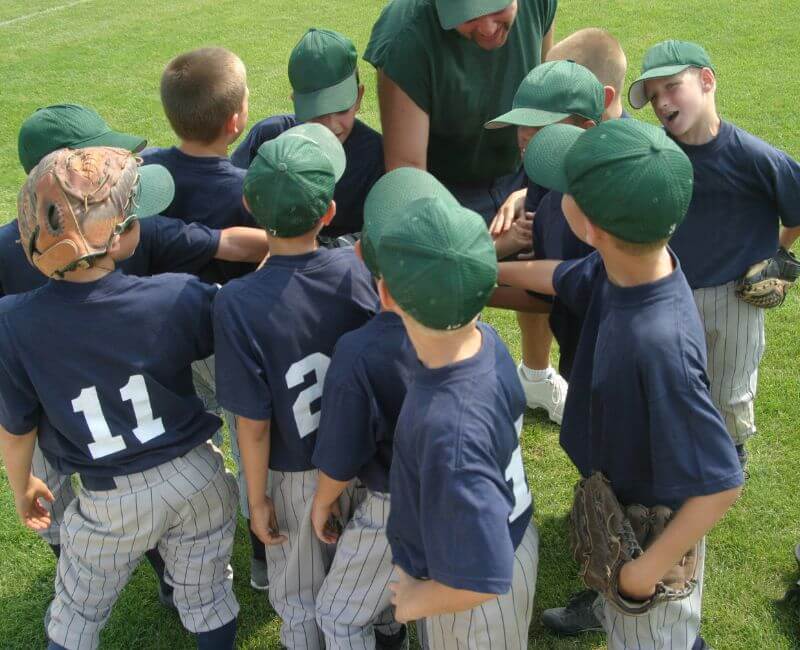
Everyone can create a travel baseball team. It doesn’t matter if you’re a parent, high school teacher, or someone who coaches college kids.
The highlight of the season is the travel baseball tournament. Bringing together talented teams from different parts of the world to compete.
This lets players show their skills to a bigger audience, including scouts and college coaches. These tournaments are organized by many institutions and happen locally, regionally, or even nationally.
There’s nothing cooler than the USSSA World Series, though. Every year, it’s hosted by the United States Specialty Sports Association.
You’ll find talent from all over America coming here to fight for that top spot. But another epic tournament is the Triple Crown Summer Nationals, where they hold it at Myrtle Beach
in South Carolina. It attracts teams from everywhere and is known for great competition and vacation vibes.
A unique little competition is held in Cooperstown, New York, known as the Cooperstown Dreams Park Tournament.
Cooperstown, known as baseball’s birthplace, offers a unique week-long stay in baseball-style barracks. You can visit the National Baseball Hall of Fame.
These intense and challenging tournaments bring out some of the most talented players young kids have to offer. It’s also a great way to boost your young player’s confidence in playing on those big stages!
Different Levels Of Travel Teams And Their Requirements
It’s not just one level fit all for travel baseball teams. They’re organized into various levels based on skill, experience, and commitment from players.
Imagine putting someone who only knows how to throw with moderate force into a contest against someone who does it with full force.
The team you choose for yourself should align with your skill level, how much free time you have, and your developmental needs as a player. Here’s an overview of different levels:
1. Local Travel Teams : For beginners starting their journey through travel baseball. The games they play are mostly local or within a close driving distance. Practices only happen a few times a week, and games during the weekend.
2. Regional Travel Teams : For players with more experience and higher skill levels. They go on trips for games and tournaments that will require overnight stays at places. Commitment level is higher, with practices being more frequent along with a longer season.
3. Showcase Travel Teams : The big leagues of young kid baseball players. These teams are made up of highly skilled people who are very serious about baseball. They have college scouts and recruiters present their games. This includes going to different states for showcase tournaments.
You’ll need to be extremely committed to even think about trying out for this team, and their practices are rigorous and frequent, lasting all year round!
Benefits of Playing in a Travel Baseball Team
A lot of benefits come from playing travel baseball.
The biggest one? It can help players get to their goals. It’s not just about playing a game, especially when you want to make it big. It’s actually an experience that provides lifelong skills that can be applied everywhere else.
Competition in recreational leagues is nothing compared to this. It’s way higher. This allows players to grow new and old skills at a faster rate.
There’s also an intense training schedule that demands discipline, resilience, and focus. These qualities go beyond just sports.
Participating in high-profile tournaments also gets the attention of other coaches and scouts. Which makes it easier for them to open doors for scholarships and professional contracts.
Traveling away from home just for games might seem like a drag, but it builds responsibility and maturity. It is a demanding journey for sure, but very rewarding.

Did MLB Players Play Travel Baseball?
Definitely! A lot of Major League Baseball (MLB) players used travel baseball as their starting point, too. It gives them all the exposure they need, honing skills at such a young age along with fierce competition.
Take Bryce Harper , for example. He’s one of the biggest names in MLB today. His journey started back when he was a child playing for the Southern Nevada Bulldogs 14U travel team. The opportunity came up where he could go against older players who were more experienced than him. This experience helped shape his professional career.
Albert Pujols also played travel baseball when he was younger on his team called Fort Osage Indians Travel Team before sailing into the Hall of Fame.
Clayton Kershaw ? Yeah, him too! Another name you hear often in MLB didn’t start there either — he played for the Dallas Tigers Travel Team where he developed early on gaining crucial skills and discipline that are instrumental in his success today.
How to Find a Travel Baseball Team in Your Region?
If you’re a young baseball player who wants to take their skills to the next level, then joining a travel team is a great opportunity. If you are a parent and want to make your child the next MLB star, then travel baseball teams are a great place to start with.
These teams play across the country and allow players to show their talents against top-tier competition. But how do you find one of these teams?
Here’s a guide on how you can join a travel baseball team in the USA.
Check your local youth baseball organization.
Your first step should be checking with your local youth baseball organization. Chances are they have travel teams that play in leagues and tournaments outside of the regular season. If they don’t, then it’s likely they know someone who does.
Drop by showcases and camps.
In-person events like showcases and camps are great places to meet coaches and scouts from travel baseball teams. They’re designed specifically so players can showcase their skills and get noticed by recruiters.
The internet holds many answers, including finding a travel baseball team. Websites like USSSA Baseball, Perfect Game USA, and Travel Ball Select list lots of travel baseball teams based on state, age group, and skill level — all at a click away.
Talk to other parents and players.
If you want first-hand experience, then talk to other parents or players who have been through this process before. They can give useful insight into which teams are reputable, well-run, and competitive.
For example, if you live in Texas, then one option could be the Texas Bombers Baseball Club — an organization that has multiple teams at different age levels and is known for developing young talent. You can learn more about them by visiting their website or attending one of their tryouts.
How to Find the Perfect Travel Baseball Team?
Identify the skill level and commitment of the player.
First thing first, you need to figure out how committed your child is to the sport and their skill level. If he is naturally gifted athlete then you should help him to follow his dream.
Research Local and Regional Teams
Begin by looking at teams that are close by. These teams usually have varying levels of skill and serve as great entry points for most players.
You can check their websites and social media pages to learn more about them such as philosophy, coaches, players, and game schedule.
Attend Local Games and Practices
Sitting in on local games and practices allows you to get a firsthand look at how they run things. You’ll be able to see their coaching style, how they interact with the players, and the overall team dynamic. With this insight, it’ll be easier to make a decision.
Speak with Coaches and Parents
While observing is good, it isn’t enough. Take some time out of your day or week to speak with coaches.
This allows you to gain an understanding of their training methods, the expectations they have for your child, and the goals they want them to reach. It’s also good practice to talk to other parents so you can get a general idea of what people think about the team.
Consider Logistics
Logistical factors are important, too, so don’t forget about them. Make sure that the team’s practice location is suitable for you and your family’s schedule since it may be far away from where you currently live or work.
The game schedule should be looked at as well because there could be conflicts in dates that would keep you from attending games.
Tryouts & Evaluations
Most teams hold tryouts or evaluations for people who are interested in joining. If this is offered, take advantage of it because it gives your child the chance to showcase their skills and for you to see if the team would be a good fit.
A player’s evaluation is also helpful because it gives you insight into how strong the team itself is.
Travel Baseball Season Preparations
Preparations before the pre-season.
Before the baseball season starts, you’ll want to make sure that your child is mentally and physically ready for the long days ahead.
So, let’s start with an off-season workout routine to help build strength and agility. But don’t forget about eating well and getting enough sleep. Plus, practicing regularly can take their fielding, pitching, and hitting skills way up.
During the season
Once the season starts, it’s important to stay fit and perform at your best. You’ll want to communicate with their coach to keep track of your child’s progress as well as any areas they need improvement in.
Another thing you should do is show up to their games and practices. It helps you stay in tune with how the team is performing and also supports your child. And finally, always keep their lines of communication open, whether it’s about pressure or their anxiety.
Post-Season
After a long season, it’s important to take a break. Reflect on the games you had together. Acknowledge all the good things they did but also focus on areas they can improve in.
Give them some downtime so they can rest and recover. Even though they’re chilling around, don’t let them become bums — physical activity is still important for them during this time.
Travel Baseball vs. Little League
Both types of baseball have their own unique experience and benefits that come along with it. The choice of which one to put your kid into mostly depends on what they want out of it.
For example, travel baseball is more competitive. It attracts players who are committed to sports no matter what and are willing to travel around just for a game against top talent in various regions. Not only does this provide intense competition but also high-level coaching.
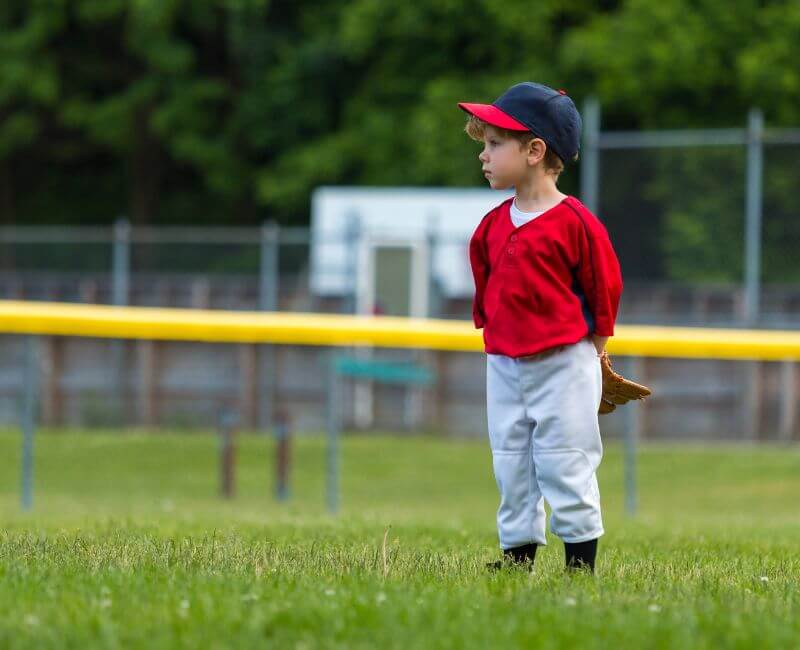
It does require a lot of time, as seasons are much longer than in little leagues with more games and practices.
If you want your child exposed more, then this would be a good option, as you can see from Bryce Harper, Albert Pujols, and Clayton Kershaw.
Now, little league baseball is less demanding. It’s generally more focused on the community and not so much on traveling and time.
It’s actually a great option for kids who still love the sport but aren’t ready to commit to such a demanding schedule. They focus on learning fundamental skills, enjoying the game, and fostering a sense of community.
You can learn more here: Travel Baseball Vs Little League
The Cost of Playing Travel Baseball
If your kid has a future in baseball, you might want to consider enrolling them in travel baseball. The only problem is that this option is much more expensive than local leagues.
Local leagues tend to have low costs because they don’t do as much traveling as travel teams have to do. On top of paying for the actual games themselves, there’s also the top-of-the-line coaching and amazing facilities that the team needs to cover.
You’ll be hit with fees like equipment, uniform, tournament, travel (like gas and airfare), and a team fee.
The team fee alone can include things like league fees, practice facility rentals, and salaries for the coaches.
And let’s not forget about any extra training or lessons they need in order to take their skills up a notch.
It’s always good to ask the people organizing the league what you’re paying for specifically because then maybe it won’t seem so bad (it probably will still seem bad, though).
But it really does come down to where you live.
Depending on that, it could cost you anywhere from $1,500-$3,000 per season. And if you’re on one of those elite teams competing at national tournaments, then I’m sorry, but it’ll probably cost way more.
Find Out How To Choose A Coach
A good coach doesn’t just teach how to play sports but also builds discipline and confidence, along with fostering a love for the game. Here are some tips on picking a coach:
Experience And Certification : A coach should always have some kind of experience coaching youth sports, but having proof that they passed some coaching program can give you peace of mind, knowing they know what they’re doing.
Coaching Style : Every coach is different and will treat their athletes differently, too. Some will be very intense in trying to push their players, while others are more relaxed yet inspiring. Pick what works best with your child’s personality.
Communication Skills : A good coach knows how to explain things in a way that’s easy for their athletes to understand. They should also be great at talking to you and other parents.
Focus On Development : It’s better for your kid to improve their skills rather than just win all the time. Look for coaches that will work with them on that.
Reputation : Finally, look into what other people say about the coach. Not only other players but parents, too. It doesn’t hurt to ask around or even watch them during practice if you can.
Things to Know About Uniforms and Equipment in Travel Baseball
Uniforms and equipment are a necessary investment in travel baseball. It can be beyond what you expect from Little League. Here’s a quick rundown of what your child might need:
Uniforms : Most travel baseball teams have their own custom jerseys that come with pants, caps, belts, and socks. Some teams may even have home and away uniforms, so check with the manager first.
Gloves/Mitts : Get your child a good quality glove or mitt that suits the position they play. For example, catchers and first basemen have their own special mitts, while outfielders use bigger gloves compared to infielders. Check out the Best Youth Infield Gloves
Bats : Bat rules can get very specific, depending on the league. Before you buy one, make sure you understand what kind is allowed. Also, consider their height, weight, and hitting strength when selecting the right bat size .
You can check out my list of Best Youth Baseball Bats
Helmets : No matter how old or young your child is, they need a batting helmet. Some leagues even require faceguards as well. Check out the Best Youth Baseball Helmet
Cleats : Running on grass and dirt requires traction, which is why cleats are used in baseball. However, be aware that some leagues don’t allow metal spikes, so again, you should always check if there are any shoe restrictions.
Protective gear : Depending on the position they’re playing at, your kid may need extra protection such as shin guards for their legs or a chest protector for their torso
What is a good age range for travel baseball?
Travel baseball typically starts around 7 or 8 years old and goes through high school. However, the age that you can join may differ depending on the league or team.
How much does it cost to play travel baseball?
The price of playing travel baseball could be greatly different depending on things like where you live, what team you’re on, and at what level you play. You’ll have to pay for league fees, uniforms, equipment, and even the costs of traveling and staying in other cities for away games.
How often would we need to practice?
Usually, travel teams practice more often than recreational ones. It’s common for them to meet several times each week. But it will depend on the time and dedication your child’s coach expects.
How far do they have to go?
Again, that’ll depend on what league your child signs up for. Some teams only need to go a couple of miles, while others will have to cross city lines.
Can my child also play another sport?
It all depends on how much time both sports require. Understandably, travel baseball takes up quite a bit of time and energy, so consider if they have enough for both.
Overall Worth of Travel Baseball
Traveling with a baseball team is no joke. For players and families alike, it’s considered a big commitment that takes up lots of time, money, and energy.
And while it opens up new opportunities, the best reward for joining one is amazing! The skills learned, and knowledge gained from playing at higher levels is priceless.
Plus, it builds character, helping to teach important lessons like teamwork, dedication, success handling, and, most importantly, failure handling. And let’s not forget about the friendships built along the way from spending hours with teammates in different places across the country.
Even though some costs and sacrifices come with this commitment, most families say joining a traveling baseball team was totally worth every bit of it.
Just remember, the end goal is to love the sport and grow as a person.
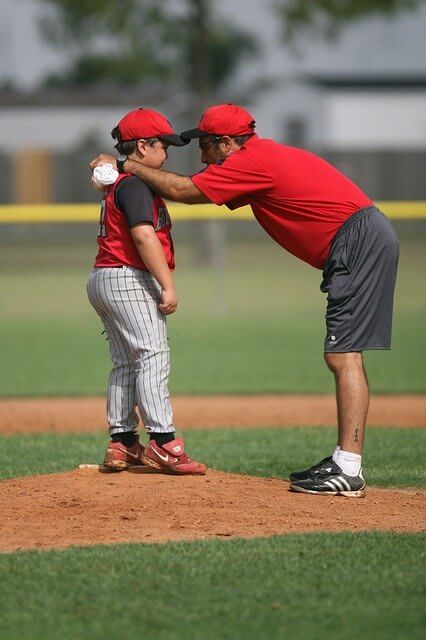
Hello everyone. My name is Jason Butler, and I live in California, America. I was a professional AAA Minor League Baseball player. I lost my chance of playing MLB for injury issues, but I did not lose my love for baseball. I attended the coaching training program and am now working as a coach in a small school in San Diego.
I always love to share my experience and knowledge if that can help you. Play baseball, and stay fit.
The Ultimate Parent’s Guide to Travel Baseball | Everything You Need to Know
March 14, 2023
49 min read

If you’ve got yourself a youth baseball player, you’ll probably start hearing all about travel ball soon – if you haven’t already.
Travel baseball can be rewarding and exciting for both you and your ballplayer.
It’s a chance for your child to substantially develop their baseball skills and passion while having a ton of fun.
And a chance for you to foster that positive growth and love for the game while joining a new social tribe yourself – that of the travel ball parent, with its fulfilling experiences, camaraderie, and norms, just like any good tribe.
But, travel ball can also be a huge commitment. It often involves a significant financial and time investment from you and your budding athlete.
So before deciding to play travel ball, you should carefully consider what your child will get out of it and how it might affect your entire family.
Several factors should go into this choice of whether or not to play club ball.
And in this ultimate parent’s guide to travel baseball, you’ll learn how travel ball works, the pros and cons of travel ball vs. recreational baseball, what to look for in a new travel team, and even how to start your own travel team.
Let’s hook-slide in together.

# The Difference Between Travel and Recreational Baseball
# recreational baseball.
Recreational baseball often refers to Little League. Although, there are other organizations around the country, like PONY or Cal Ripken Baseball, that host recreational baseball leagues for their localities.
Local is a keyword here. That’s usually the main difference between rec and travel ball – recreational ball doesn’t require travel.
Recreational leagues focus on players learning the basics of the game, especially at the youngest levels. Seasons run from late spring to early summer. And you can expect around two games per week.

# Travel Baseball
Travel ball, on the other hand, refers to teams that travel to other cities or states to play baseball.
Club teams might be a single team or an entire organization with several teams spanning different age levels.
Another major difference is that travel ball is often played year-round. Not having extended off-seasons ups the commitment levels for all involved significantly.
A few of the biggest organizations in the travel ball world are the United States Specialty Sports Association (USSSA), the Amateur Athletic Union (AAU), Triple Crown Sports, and Perfect Game.
These organizations will host most of the tournaments that travel teams compete in.
Traditionally, travel ball has been a higher level of competition than Little League, meant to train elite players who had their eyes set on collegiate opportunities.
However, as travel ball becomes more ubiquitous, the level of competition can now run the gamut a bit more between extremely high to moderate-low.
Travel baseball, as you’ll see, is also much more expensive in terms of both cost and time commitment than its recreational variety.

# The Pros and Cons of Rec Ball Versus Travel Baseball
Both recreational and travel baseball have their merits and drawbacks. You and your child should consider the pros and cons of both before deciding which type of team to play on.
# Little League Pros
- Local – If you don’t fancy traveling around two weekends out of every month, then recreation leagues might be better for your family. Part of this locality is time. The amount of time you and your ballplayer will spend at team practices, games, and individual workouts is significantly less in recreation baseball.
- Learn a lot – Little League, PONY, or Cal Ripken Baseball teams’ emphasis on learning and having fun lets your kid discover and grow to love the game in a low-pressure environment. Some children benefit more from this, especially in the beginning, while others thrive only with higher levels of competition.
- Less expensive – The average fee in the U.S. for a season of Little League is $150, but it could vary as low as $30 and as high as $250 in some areas. Travel ball can easily cost three to four times that. But we’ll get into the details and rough estimates of this cost in just a bit.

# Little League Cons
- Dependent on your area – Having a local baseball league often depends on the interest in your area. No interest could mean no teams. The level of competition also depends on who’s playing and how much talent your area happens to have.
- Not a conduit for playing at the next level – Although it used to be the case, Little League is no longer a safe route to playing high school and college baseball. Today, kids who want to reach these levels and find success once there, must, in most cases, find a travel team to play on at some point in their journey. Of course, there are exceptions to this for ballplayers who naturally have top-tier talent. And obvious caveats must also be made to make room for how competitive or noncompetitive a particular high school might be. But these unique instances aside, the reality for many parents and coaches on the ground is that playing rec ball only these days makes it less likely for a young man to be an impact player in high school or college.
- Coaches – With recreational baseball, the coach is usually one of the players’ parents. And this person may know little to nothing about baseball, or about managing a youth team. They are exclusively volunteers after all. Sometimes you can get very lucky with elite-experienced parent volunteers and other times not so lucky – it's kinda a crapshoot.

# Travel Ball Pros
- Better competition and coaches – Travel ball usually affords more competitiveness and more experienced coaches. Travel ball coaches might even be former college and high school coaches who’ve started a travel club. And larger organizations often pay monthly or seasonal paychecks to these professional coaches – many of which will not have a child on the team.
- More games – Instead of the 8 games per month during a short, designated rec season, your child can expect to play much more with travel ball. It’s year-round, and the most games occur during weekend tournaments in the summer. Though some yearly tournaments are weeklong affairs. At each tournament, teams play between three and ten games – depending on how well your team does in bracket play. By playing more games, your kid gets more exposure to baseball and is afforded more reps to cultivate their developing skills.
- Nicer facilities, opportunity to travel – Travel ball tournaments are usually held at nice facilities with plenty of room for parents to watch and for teams to hang out when they’re not playing. Club ball also gives your kid a chance to venture outside their native city or state, which can be a valuable learning experience for them.
Unlock your ballplayer’s full potential
Find the perfect vetted coach to build a solid foundation or take your player's skills to new heights.
# Travel Ball Cons
Costly – A season of travel ball can run anywhere from $800-$28,000 per year, depending on tons of different variables.
The numbers above may be less common on both the low and high side – but both are certainly possible.
The second number ($28,000) that’s causing your blood pressure to rise higher than Boston’s Green Monster is meant to reflect a total expenses possibility with everything maxed out.
You may not find a number that high when you Google travel ball expenses, but the writers of those articles are likely not including every single cost into their calculations.
Here are some things to truly consider:
You will be expected to pay base starting fees and possibly tournament entry fees for your team or organization.
And, sometimes, you’ll also be on the hook for monthly team dues along with an annual organizational fee.
Also, you’ll purchase all of your ballplayer’s personal baseball equipment and uniforms if your team’s not sponsored.
And in travel ball, the pressure to get your ballplayer the top of the line equipment in all categories is much stronger than in rec ball.
Next, many sports complexes that host tournaments charge daily gate fees on top of not allowing outside food or drinks.
And you and your family need to eat and stay hydrated during these all day tourneys, which leaves the complex’s overpriced snack shack or restaurant as the only option at times.
Don’t forget the hotels, food, and transportation costs for any and all out-of-town games, too.
Further expenses include the gas and increased vehicle maintenance that you will surely incur driving to so many practices and games within your county or state.
Another common expense that sneaks up on parents are weekly private or group lessons that are often expected by competitive programs.
Besides hitting, pitching, catching, or fielding sessions, many parents also opt for sport performance training and athletic optimization services – i.e. strength and conditioning classes, a physical therapist, a chiropractor, etc.
Another cost is found by participating in team bonding and fundraising activities, where you might be expected to bring snacks and drinks or buy tickets – such small things add up during the course of the year-long travel season.
Finally, if your ballplayer is recruiting age, this higher number above includes college camps and showcases throughout the year.
It also includes getting his professional skills video produced, so you have something great to send over to college coaches.
Do not be too alarmed. Many of these expenses are totally avoidable and up to your family's budget.
But, you should also know there tend to be unspoken expectations and incentives for some of these activities that you might feel are avoidable once you’re actually inside of competitive travel programs.

- Time – Travel ball is a significant time commitment. The two weekends per month out of town for tournaments is only a small part of it. Your child might also have practice or scrimmages against other travel ball teams during the week. And, as mentioned, your ballplayer may still be expected to get professional skill and sports training lessons each week.
- Tough – The level of competition is, again, higher in travel ball. The players are better, and many teams take a “the best players play” rather than an “everybody plays” approach. Club baseball can be intense and challenging. If your ballplayer’s skills aren’t at the right level yet, then they’ll see less playing time and could get discouraged.

# Should You Switch from Rec Ball to Travel Baseball?
Parents often have mixed opinions when it comes to travel ball. In particular, there’s disagreement over what age to switch.
Some say you shouldn’t put your child in club ball until he is 13 years old, since many kids drop out of sports altogether by this age.
The rationale behind this recommendation goes something like:
Most parents can avoid paying a bunch of fees for travel ball between the ages of 7-12, when your child is statistically likely to give up the sport soon anyway. And if they’re still serious about baseball at 13 years old, then it’s worth the investment.
While some parents echo this sentiment, others strongly advise starting your kid in travel ball much sooner – if they show a real interest.
As one parent put it online when asked about starting at the 8U level, “As long as they don’t get burned out I say let em’ play.”
Another parent disagreed, however, saying that they saw “absolutely no value in travel ball with children that are so young.”
Most parents polled agree that their decision to switch depended on their circumstances.
Some said that “it is difficult to make a blanket statement” about when to switch or that decisions “are going to vary based on regions.”
Again, the latter statement points to the raw fact that certain geographic regions of the country are much more competitive in baseball than others.
Living in a highly competitive region raises the threshold necessary for things like making a high school team to the point that playing travel to gather enough skill is an almost prerequisite.
Often, the decision to join a travel team does come down to the organizations in your area. You’ll want to find out how many travel organizations there are in your locale and what their quality is.
If there are no clubs in your town or city and none nearby, you’ll be looking at a bigger time commitment and more expenses to put your kid on a club team – which will include much more driving and the potential for more hotel rentals.
But when to switch from rec ball to travel is not the most important question facing parents and ballplayers who are still on the fence about switching in the first place.
So let’s get to the heart of the matter.

# Will Your Child Enjoy Playing Travel Ball?
The most important factor to consider when making the switch to travel ball is your child’s interest in baseball.
Is your kid a competitor looking to sharpen his or her skills and continue playing as he or she gets older?
Or does your child like baseball for the fun of it, and enjoy being on the field with his teammates?
Travel baseball is a huge time commitment – but not just for you. Your child has to be willing to put a lot of personal time and energy into it as well.
# Is Your Child Willing to Give Things Up for Club Ball?
Playing travel ball means your kid will miss out on many social events with friends and family.
Birthday parties, holiday celebrations, sleepovers, school events, family reunions, can be all sacrificed to time playing baseball.
This is not say that there aren't plenty of travel ball players excelling in the classroom, because of course there are.
It's just that they need to be more focused and organized than other kids to get those same high marks, and parents should be aware of these realities.
Not only are time and special occasions sacrificed, but the money you spend on baseball – fees for the team, equipment, private lessons, etc. – is money you cannot now spend on other things your child might want.
Depending on your family’s finances, new clothes, video games, gadgets, and other material items for your son could come at the cost of playing baseball.
Whether you switch from recreational to travel baseball is ultimately down to you and your child. There are many factors to consider, some of which, like where you happen to live, are outside of your control.
The best thing you can do is educate yourself and your child as much as possible about the pros and cons of travel ball, and then make an informed decision together.
And this guide is a great start. But it should be supplemented by talking to local parents in your area and possibly finding Facebook Groups or other communities to learn from parents who have been there and done that when it comes to making the travel ball switch.
If you do decide travel ball is the way to go for your family, then your next task is to find the best team for your ballplayer’s development.

# How to Get Started on a Travel Baseball Team
# what to look for in a travel team.
If you and your child do decide to join a club baseball team, then you have five main things to look for when choosing a team.
# 1. Coaching
Here are few questions about any travel ball coach that you, as parents, will want answered right off the bat before joining their team:
- Who is the coach, and what is this person’s experience?
- Is the coach someone who knows what they’re doing in terms of baseball skills and leadership?
- Even if they know the game, are they new to the travel ball scene?
Note: this last question can become more important once your ballplayer gets into the college recruitable ages.
If it’s your ballplayer's goal to play in college, you will want to join an established program that plays in the right tournaments to get noticed, and a coach that has built a trusted relationship with college coaches and recruiters over the years.
But, if the current goal is just to improve your son’s skill set, then the coach’s knowledge and ability to articulate it might be more important to you than he or she being a travel ball insider.
Some additional, related questions to ask both the travel coach directly and to ask parents whose child is already playing under he or she are:
- What kind of coaching style is most commonly used?
- Does the coach emphasize skill development or college recruitment?
- Is the coach more like an instructor, or is the team playing to win nearly all of the time?
- Would the coach yell at a player for making a mistake on the field or pull them aside afterward to discuss the error privately?
See why SeamsUp's the #1 instructional app for ballplayers
As we’ve explored, cost is a big factor for travel ball because it’s not cheap. Make sure you get all the anticipated, known costs for the season upfront from the coach or their team administrator.
If the coach can’t give you exact figures of what things cost on their end – monthly team dues, organization fees, uniform costs, and any additional tournaments costs – before you sign on, be wary.
The coach may not be organized or experienced enough to help your ballplayer and you might end up paying more than you expected to.
Some club teams have sponsors who provide equipment and uniforms, but others will ask parents to pay for these in addition to registration fees.
You might also have to hand over a fee to help fund the coach’s stipend if they are paid for their expertise.
For some elite organizations, coaching is a full-time job, plus the coach has to travel with the team too.
# 3. Location
Here’s some questions on this front that you’d want answered:
- Do you live near a big urban center where the team plays most of its tournaments, eliminating long travel times?
- Or does the team regularly travel out of state for their games?
- It’s a travel baseball team, but exactly how much travel is involved on this particular team?
Think carefully about how much you and your kid are willing to travel and factor those expenses into the cost.
# 4. Structure
Structure-related questions might include:
- How does the team operate?
- Will your child get to see significant playing time?
- Will the team have regular practices and training sessions to attend as well?
Another important question about structure is if your kid will get to pick their position.
Meaning, will the coach let kids play where they want, or try to rotate everyone around to different positions during practices or practice games?
Of course, this last line of questioning applies almost exclusively to the youngest levels of play. From about 14U up, there is more positional specialization and team roles are established and sustained more based on the talent and performance of the individual ballplayers.
# 5. Values
Value question to get clarity on:
- What is the mission of this travel team?
- Are they helping players get noticed by college recruiters?
- Do they just try to offer more playing time and a fun environment?
Make sure their objectives line up with yours. Ask yourself as well how your child will develop as a baseball player by joining this particular travel team.
# 6. Team Chemistry
Before joining a club team you should try to gauge the team’s chemistry.
Once you commit, your child will be spending a lot of time with these teammates, so if they don’t get along or your kid doesn’t feel like he or she fits in, it could be a problem.
Similarly, look at how the parents interact with the players and each other. Are the other parents promoting a supportive environment for everyone by being encouraging?
Or are they the types to yell at umpires, coach from the stands, or take the game to unhealthy levels?
Not only will your kids be spending a lot of time with their teammates, but you’ll also spend time with the other parents.
So choosing a travel team is in a way choosing friends and peers for both you and your child.
Team chemistry should also extend to how players and coaches relate to each other. Do the coaches work hard to bolster the kids’ confidence, or are they constantly tearing them down for the sake of winning?

# Where To Look for Travel Baseball Teams
Reading up on how travel baseball works in helpful guides – like this one – is again a great start.
Don’t be afraid to ask around in your area about club baseball, either. Word-of-mouth is often one of the best ways to understand travel ball, especially how it operates in your specific city or town.
You can also look up registered teams in your area on the USSSA website or FieldLevel.com .
Again, Facebook Groups are also a great way to find local travel teams, since many teams might not have their own website.
These groups are filled with parents like yourself and coaches who relish in helping with your travel ball journey.
But maybe you have lots of playing or coaching experience and want to spearhead your own travel ball team. We’ve got you covered on exactly how to do it below.
# How to Start Your Own Travel Baseball Team

Choosing to join an existing club team is one thing; starting your own is another entirely.
Maybe you have some playing or coaching experience and you’d like to put together a team for your son or daughter. Maybe there aren’t any club teams in your area, so you’ll be starting the first.
Whatever your reasons, starting a travel baseball team is a rewarding endeavor, albeit a daunting one. You are basically starting an entirely non-profit business.
And you’ll see below that you must do many of the same steps that new entrepreneurs must do when beginning an enterprise, so make sure you have the time and skills for this undertaking before you even start.
The steps to creating a travel ball team can be broken down into four main phases.
We’ll look at each of these in detail.
# Travel Ball Team Building Phase 1 - Finding Volunteers
Before doing anything else, you should recruit some other parents or outside volunteers to lend you a hand.
Whether you’re planning to coach the team or to have someone else do it, committing to running all aspects of a team as a single individual for an entire season isn’t feasible.
To make a strong team, the internal team of coaches, team managers, or recruiters needs to be strong first.
Call on parents you know and trust, former coaches, former teammates from your playing days, or current older players to help you out.
As you’ll see in future steps below, it’s highly recommended these days to have at least one person on your team who knows marketing, graphic design, or website creation. You’ll save a lot of time and money this way.
And instead of having 2-3 full-time volunteers, it can be helpful to eventually amass a network of people who are willing to pitch in semi-frequently.
That way, you’ll have coverage if one of your coaches or volunteers can’t make it.

# Travel Ball Team Building Phase 2 - Planning Your Budget
After you have a group of people to help out, you should focus on the financial planning for the team.
Make a list of the expenses that you’ll have to cover, along with sources of funding.
Next, you should approach local sponsors about paying for some of the things you need, like uniforms and equipment.
Now’s the time to think about fundraisers as well. Any the money you raise helps lower your player fees.
Fundraisers are an important aspect of many teams, especially those without established sponsors.
Raffles, silent auctions, casino nights, bingo nights, trivia nights, and paid dinners can all make great fundraising events.
Look around at your volunteers and support staff. Do they have any skills, jobs, or relationships that can help raise funds to send your boys to the best tournaments?
Company tickets to sporting events, like box seats or concerts, make great raffle or silent auction items. And if someone owns a restaurant, a paid dinner fundraiser is a no-brainer.
Take this budget phase seriously, and it’ll save you a lot of headaches down the road.
# Travel Ball Team Building Phase 3 - Getting Your Players
Once you have some people to help and a balanced budget, you need to find some players.
It’s possible you already have a group of interested players and that’s why you’re starting the team in the first place.
But your initial seed group may not be big enough to field an entire team. So you’ll likely need more.
There are two slightly different journeys at this point in the process. One for people wanting to start a travel team by joining an already established organization and another for those starting a new team completely from scratch.
Of course, joining something that already exists is a bit easier, because they'll hopefully have team processes and even recruiting relationships in place that'll allow you to hit the ground running.
If you are joining an already established travel ball organization, then you'll want to leverage their name, social media accounts, website, and email list to help you recruit your new squad of ballplayers.
Even if this is the case, you will likely still want to create your own social media accounts that use the established organization's name alongside either the age group or grad years of your team and your last name as the username.
Here's a template for what we mean when applied to an Instagram account name:
{Established Organization Name} {The Age Group: 8U, 10U, 12U, 14U, 16, 18U or Graduation Years} {Your Last Name}
Example: LA Pioneers 12U d'Aranud
But, if you're starting a new team or organization from scratch, there will be some additional steps. To make people aware of your team, you'll want to do the following:
- Pick a name
- Create a logo
- Set up all of your social media profiles
- If possible, create a simple website.
A website can be a major differentiator between your travel team and others, as most teams still only have social media presences and no official site in the current year.
For social media, you need Facebook and Instagram profiles at minimum, because these are the first places interested potential parents in the current year will check you out.
If your logo design and website developer skills are not where you’d like, we recommend outsourcing these things to freelancers on Fiverr, UpWork, or 99 Designs.
You can find incredibly talented people who are reasonably priced and can do whatever you require quickly.
But always first look into your new network of trusted team helpers and see what skills they possess before outsourcing anything.
Once these fundamental online presences are established, you will want to make some social posts that give parents looking into your program feelings of trust.
Post about your playing or coaching experience and about everyone on the awesome team of helpers that you’ve assembled. Seek to post images or videos that convey your values as a new team.
Tell everyone you know about these new profiles, so you can build a bit of social proof for your team and encourage all of your helpers to do the same. This step alone can get you your first one hundred to a thousand followers.
Once people in your community know your team exists, you can hold tryouts for skilled players.
Seek out travel baseball message boards and Facebook groups, and post all the details of your tryouts – making sure to include a link to your shiny new website or social media profiles.
There are even Instagram profiles dedicated exclusively to posting the details of travel ball tryouts, so take advantage of these as well.
However, if you’re still not getting enough interest through these free methods, you might consider setting up paid Facebook or Instagram ads. Just make sure that the video or graphics you use for your ads are top-notch.
Again, if you’ve never created such assets or set up Facebook ads before – and they can be overwhelming to the uninitiated – lean on outside professional help in the beginning. Experts in paid media creation and management can be found all over the web.
Next, you run your awesome baseball tryouts. These we’ll leave to you, coach.
When putting together your roster though, hedge toward a bigger team rather than a small one .
Summer is an active time for kids – they have family vacations and other sports or activities to do in addition to baseball. You may not have your full roster attending every tournament at the start.
So having a team with at least 14 or more players covers you for when other commitments come up.

# Travel Ball Team Building Phase 4 - Registering Your Team
Once you have your team put together, you’ll need to register your players with at least one of the major travel ball associations in the country.
Again, these are USSSA, AAU, Triple Crown, Nations, Perfect Game, but there are others.
These associations host the travel ball tournaments that you’ll be competing in. Make sure you follow the regulations and register your team properly. Each organization has their own unique guidelines for registering.
Once this phase is complete, you still have all the practices, travel logistics, and dues collections to worry about – but you will have laid an amazing foundation for your new travel team.
Now you can enjoy the honor of helping the next generation of ballplayers find success in the game you love.
# Wrapping Up Our Ultimate Parent’s Guide to Travel Ball
As you’ve undoubtedly realized – because we repeated it more than once – travel baseball is a big commitment.
Switching from recreational baseball to travel ball shouldn’t be done lightly.
It should also be a joint decision between you, your ballplayer, and the rest of your family. If you or your kid is interested in club baseball, then make sure you both understand the impact it’ll have on your lives.
Once you know what you’re getting into, you can make the best decision together.
About the Authors

Courtney Withrow
Professional Writer
Originally from the U.S., Courtney is a Brussels-based freelance writer with a Master’s degree in International Relations. She grew up playing softball and still loves the game.

Chase d'Arnaud
Chief Talent Acquisition Officer & Baseball Business Ops
Chase d'Arnaud is a 7-year veteran of Major League Baseball. He played for the Pittsburgh Pirates, Philadelphia Phillies, Atlanta Braves, Boston Red Sox, San Diego Padres, and San Francisco Giants.
Grow your business
Stay on top of the biggest trends in baseball & softball coaching. And get tips, tricks, and full step-by-step guides to accelerate your brand.

Travel Baseball Pros And Cons
- May 3, 2023
For children, travel baseball is the key to the world of high-level college play . If you want your kid to excel in this sport or if your child shows serious interest in it, youth travel baseball is worth a shot.
With that said, what is travel baseball exactly, and how does it differ from other forms of youth baseball? Read on to find out!
What Is Travel Baseball?
Travel baseball is a form of youth baseball that is played away from a team’s immediate area . Travel teams may travel to another city or state to participate in baseball travel tournaments.
Generally, travel baseball is viewed as an intermediary step between Little League baseball and high school or college-level baseball . Travel baseball is usually much more competitive than recreational baseball leagues like Little League. Besides that, youth travel baseball allows for more exposure for a young baseball player, potentially providing a big boost to a child’s baseball career.
Travel baseball vs. Little League
The Little League embodies traditional youth baseball where children have fun rather than become engulfed in the tough training world of more “serious” youth baseball environments (like travel baseball).
Kids may start playing in the Little League from as young as age 4 . LL games are very rarely held outside a local area , and in this league, children will be learning the basics of hitting, pitching, and other essential baseball concepts.
Little League was traditionally an intermediary stage between recreational youth play and middle to high school baseball . Back in the day, sticking to the Little League and other recreational programs was enough to prepare young players for high school- and then college-grade baseball.
These days, this is no longer the case . Middle school programs are now either subpar or non-existent. Little League is a viable alternative to recreational baseball, but when it comes to building the basis for elite-level competition, it pales in comparison with travel baseball.
With all that in mind, let’s conclude this section with these two points:
- For professional-level development, travel baseball would be a logical next step for children aged 11 to 12 .
- Recreational leagues like Little League or local adult baseball leagues are a great choice for non-competitive baseball players who want to have fun and don’t want to make their life revolve around baseball.
The Benefits Of Travel Baseball For Aspiring Players
My overview of travel baseball and its benefits was kind of vague so far. Now, let’s look at the specific benefits of playing at travel teams compared to rec baseball.
More exposure
I’d say that exposure is the biggest advantage of travel baseball . Getting yourself in front of the right people is important for a child’s long-term success in this sport – travel baseball allows you to leverage this.
At the very least, travel baseball gives children the opportunity to show their worth to high-level college baseball coaches who may have substantial influence in the sport . College scouts also often attend travel baseball meetings. In case your child has what it takes to succeed in baseball, a scout will identify their talent and perhaps give your kid a chance to establish themselves at a higher level.
More competition and thus motivation
Players in travel baseball are better-versed in baseball and are more competitive than rec players . This is actually a good thing – young players will have someone to look up to and will be more motivated to improve .
Children will also learn to face and hopefully overcome challenges that they wouldn’t encounter in recreational baseball. Fierce competition from better players forces weaker athletes to adapt – this is arguably the best aspect of travel baseball, though I still think that exposure is its #1 benefit.
Better coaching
Travel baseball team coaches are typically more competent than their colleagues at recreational leagues . Although travel baseball coaches will put more strain on a young player than a rec coach, the results will accordingly be considerably better.
Not only that, but travel baseball teams often employ former professional coaches who may have strong networks in basebal l. Such coaches not only know how to make a skillful player but also may be able to connect athletes with other teams.
More eye-opening experiences
And finally, travel baseball is laden with eye-opening experiences .
People – and even more so kids – often don’t realize that there is an unexplored world beyond the limited horizon they have become so accustomed to . Throughout their travel baseball engagement, children will be able to meet people with different backgrounds, characters, and views of sport and life in general.
Some encounters with other players will help your kid appreciate sportsmanship, while others will teach them how to ignore fan hate and how to stand up for themselves.
The immense load of the sport itself will also help children get used to investing effort to get results and make them understand that life has its ups and downs .
The Disadvantages Of Travel Baseball
Travel baseball is far from perfect – it has a few disadvantages that parents ought to know about:
- It’s really expensive. Traveling costs can rack up to $5,000 or even $10,000 a year, though in most cases, families seem to spend around $2,500.
- It’s stressful for parents. Parents will have to plan ahead to accommodate their children’s play schedule. Frequent travel can put a toll on any parent, not to mention the financial dent it makes in parents’ wallets.
- Mental and physical strain on children. Tougher and more frequent workouts will undoubtedly produce better players, but they also strain children considerably – both mentally and physically.
- Not everybody will make it in travel baseball. Travel baseball is highly competitive, and usually, only the best players find a place in a travel baseball team. Not everybody will thus make it in this sport.
With commitment, skill, and some luck, travel baseball can be a gateway into professional sport. However, before you decide to have your child join a travel baseball team, you must consider its advantages and disadvantages – both for you and your kid.
Best Baseball Batting Gloves Reviewed
Top 25 Greatest Players in Boston Red Sox History
Marucci 2020 Cat 8 Baseball Bat Review
What To Consider When Looking For A Travel Baseball Team
Now, I’ll outline a few things that you should be looking for in a travel baseball team – in case you are thinking about it as a future for your child.
Costs are going to be the #1 consideration for most parents.
I can’t tell exactly how much you’ll have to spend on entry fees, travel, and equipment – but it will most likely be under $2,500 per year. But depending on certain factors (more about these below), your costs may climb higher – in 2011, CBS News reported on parents who paid $4,000 for their kids’ participation in travel baseball .
You won’t find accurate cost estimates easily – you’ll have to dig deep for that. But one thing is certain – bigger teams with higher-quality coaches are going to cost you more.
To hopefully set you in the right direction, here are some major factors that will affect how hard travel baseball will hit your pocket.
- Your location. Teams based in rural areas will have to travel often and far. In contrast, travel baseball teams in important baseball hubs – like California – won’t have to drive or fly to another city or state too often.
- Whether the team will provide equipment. Bigger and more successful teams may have sponsorships with baseball gear brands. In these teams, players get their equipment for free or at a significantly reduced cost.
- Access to baseball facilities. Some teams have to rent baseball facilities to train. Needless to say, rent is going to be covered from your own pocket – whether in part or entirely. With teams that have their own facilities or train only at public fields, this will not be a concern.
- Coach compensation. Some teams pay small compensation to their coaches or cover their travel costs. Again, a team with such a model will transfer the responsibility for covering compensation to you. This will increase annual fees, but paid coaches are also likely to do their job better.
Travel tournaments in which the team participates. Teams participating in higher-level tournaments will have to pay higher entry fees. More competitive and “serious” teams are therefore going to cost you more.
What about coaches ? Some people may, unfortunately, overlook this crucial aspect.
Here are a few questions that you need to find an answer to regarding coaches:
- Does the coach encourage their players?
- Does the coach give tips and advice tailored to the player’s personal strengths and weaknesses?
- How does the coach handle mistakes? Do they scream at players?
- Does the coach treat all players equally? Or maybe they have favorites in the team?
Don’t become captivated by clean facilities and promises of success in the sport – you may overlook jerk coaches if you do.
3. Location
Your location will matter if your child wants to compete at the highest level in the future.
The thing is that major baseball states like California, Florida, Georgia, or Louisiana have plenty of elite travel baseball teams to choose from . You won’t have to travel far from home to find a worthy team for your kid.
On the other hand, in areas where baseball isn’t that popular, you may have few to no options . Even if there is a baseball team in such a place, it probably isn’t a super-competitive team with excellent baseball coaches.
Suppose your kid is unlucky enough to both want to play competitively and live in a baseball-less area. In that case, you’ll have to travel to another city or perhaps even state to find the opportunities you or your child desire . Not only is travel time-consuming, but it is also costly. You will have to make compromises – either play in a low-grade team or spend time and money to travel to another area.
4. The reputation of the team
The reputation of the team matters as well – for the athletic future of your child. If your kid plays in a team known for unfair plays, they may have trouble getting into a better team down the line.
Beating bad sports habits out of a baseball player can be challenging, and unless coaches are dealing with remarkable talent, they’ll prefer to work with someone who has the right foundation for their team’s goals and values.
5. Competitiveness and skill level
Is your kid looking just to have fun? In that case, more relaxed, less competitive Baseball travel teams would be ideal. Children who don’t intend to reach exceptional heights in baseball will feel out of place in a super-competitive team where everybody works at their limit.
In contrast, if your kid is ready to compete seriously, a more “upper-class” team with skilled players and a demanding coach will immensely motivate them.
In the end, youth travel baseball provides entry to competitive high school and college baseball. Consequently, it gives children a chance to try themselves in competitive play.
Travel baseball is a costly endeavor, and it requires plenty of planning and compromises on your part. Weigh the pros and cons and try to determine what would be the right choice for your child – more light-hearted, recreational leagues, or an astronomically competitive travel team.
Sinker VS Curveball Comparison May 3, 2023
How to play 2nd base? May 3, 2023
College Baseball Workout Program May 3, 2023
Understanding the Significance of WHIP in Baseball Statistics May 3, 2023
2301-39 Roehampton Ave Toronto, ON M4P 1P9 Canada
- +1 647 365 5077
- [email protected]
TheChampLair.com is a participant in the Amazon Services LLC Associates Program, an affiliate advertising program designed to provide a means for sites to earn advertising fees by advertising and linking to amazon.com.
The State of Travel Ball [Real Parent Survey Results]

By Bat Digest
In June 2023, we conducted a survey involving approximately 700 parents of baseball players regarding their experiences with travel teams. We aimed to present this data in an annual report called the State of Travel Ball, making it easily accessible to a broader audience. To assist parents, players, and coaches in forming their conclusions, we have focused primarily on presenting factual information rather than providing extensive commentary or opinionated analysis. This report seeks to answer the question: Is Travel Ball Worth it?
Quick Takes
- Despite all the costs, travel, and coaching issues, most parents are ‘satisfied’ with Travel Baseball.
- The average annual travel ball player pays $2,178 per year. This does not include uniforms or any ancillary fees.
- The average travel baseball player participates in about 47 games and 45 practices. However, there is wide variation here.
- Over 40% of players have two or fewer months off baseball per year, while only 10% have more than six months off.
- The “typical” family travels about eight nights yearly because of the travel ball.
- The typical family travels between 10 and 15 miles to practice. More than a few, however, travel 50 or more miles.
- 20% of respondents believe they are ‘absolutely’ playing college baseball.
- Over 50% of Travel Ball coaches are paid.
- Most parents believe their travel ball team does NOT overpitch their players, although most teams pitch less than half of their players.
Selection Bias
This data, like all data, should be taken skeptically. The bias from individuals self-selecting to take a survey about Travel Ball implies a lot and immediately skews the data. We aren’t interested in giving breathless commentary here, so we’ll let the data speak for itself. But, be sure, we know that such bias in the data exists, but that doesn’t make it useless or uninteresting.
Travel Ball Satisfaction
About 2/3 of Travel Ball parents are satisfied with their experience. Although, as you will see below, most parents are satisfied, it costs a lot of money, a severe amount of time, and requires more than a week of sleeping somewhere else.

To be sure, this is respondents that play travel baseball, so the selection bias is real with this one. But, if you are considering travel baseball, do know that, at any given time, most parents appear to be happy with their decision to participate despite all its potential drawbacks.
The Average Price of Travel Ball Teams
After excluding families that reported zero team fees, our analysis shows that parents investing in travel baseball face significant financial commitments. On average, families spent approximately $2,178.25 on team fees in the most recent year. These costs varied considerably, with a standard deviation of about $1,411.04, indicating a broad distribution of expenses. At the lower end, we observed that 25% of families spent $1,000 or less, excluding those who reported zero costs. The median expenditure, a more representative measure of a ‘typical’ family’s spending due to the skew in our data, remained at $2,000. On the higher end, 25% of families spent up to $3,000, with the highest reported costs reaching $10,000. These figures underscore the substantial investment parents make to support their children’s involvement in travel baseball, reflecting the sport’s potential to foster enriching skills, experiences, and opportunities. Recognizing these financial commitments is essential as we continue exploring ways to enhance our programs’ value and impact.

The Number of Games and Practices
On average, a travel baseball player participated in approximately 46 games per year and, based on our data collected, ranged from 3 to 100. The majority of players stayed between 20 and 60 games.

Compare that with the number of practices held. The average parent of a player reported 52 practices (one a week) per year. The median number of practices (that is the middle team) had around 45 practices. The vast majority of practices are between 24 to 75 players.

The scatter plot below visually compares the number of games played and practices attended by each individual in the dataset. Each point represents an individual, with the x-coordinate indicating the number of games played and the y-coordinate showing the number of practices attended.
We can see a positive correlation between the two variables, suggesting that individuals who attend more practice also tend to play more games and vice versa. However, there is some variation in this trend, with some individuals attending a large number of practices but playing fewer games and others playing a large number of games with fewer practices.
It’s also worth noting that a cluster of individuals attend around 45 practices and play around 45 games, which aligns with our earlier finding that the median number of games played and practices attended is 45.

Number of Months Off Travel Baseball
The bar plot below shows the distribution of the number of months off from travel baseball as a percentage of total responses.
Here are the percentages for each category:
- No months off : 2.41% of players
- 1-2 months off : 39.49% of players
- 3-4 months off : 36.44% of players
- 5-6 months off : 11.56% of players
- 6+ months off : 10.11% of players
This analysis reveals that the majority of players (75.93%) have a break of 1-4 months in a year. A smaller percentage of players (21.67%) have a more extended break of 5 months or more. Only a tiny fraction of players (2.41%) have no months off.
These percentages provide a more nuanced understanding of the number of months off distribution, giving us insights into the typical rest periods and the intensity of engagement in travel baseball.

Number of Nights Away from Home
We also asked parents how many nights they spent away from home because of travel baseball. We know this answer often gets muddy as many family vacations are combined with travel tournaments. In any case, we asked the surveyed to give their best shot at how many nights they spend away from their home because of travel ball.

- Average Nights Out : Families spend approximately ten nights out due to travel baseball in a year.
- Range of Nights Out : The number of nights out varies, with a minimum of 0 and a maximum of 30 per year.
- Most Common Number of Nights Out: Most families spend 5 to 15 nights out.
- Median Nights Out: The median number of nights out, which provides a more representative measure of a ‘typical’ family due to the skew in our data, is eight nights.
Distance of Travel Ball Practice
The practice distance data for travel baseball reveals that families travel approximately 15.5 miles for practice on average. The distance varies widely, ranging from a minimum of 0 miles to a maximum of 100 miles, indicating the diverse geographical spread of families involved in the sport. Despite this wide range, most families typically travel between 5 to 15 miles for practice, as revealed by the distribution analysis.

The median practice distance is 10 miles, suggesting that half the families travel ten or less for practice. This data underscores families’ significant travel commitments for practice sessions in travel baseball and the time commitments for games and practices. It highlights the extent of dedication and commitment that families demonstrate toward supporting their children’s involvement in the sport.
College Ball Aspirations
We asked each respondent about the future of their player in college ball. Specifically, will your player play ball in college? These are how the answers break down.

- Definite : Approximately 19.84% of the respondents were confident in their future in college baseball.
- Probable: A slightly higher percentage, 23.36% of the respondents, said they would ‘probably’ play college baseball.
- Maybe : The largest group of respondents, 32.00%, were ‘maybe’ considering their future in college baseball.
- Lack of Clarity : A significant portion, 20.48%, expressed that they were ‘unsure’ about college baseball.
- No Interest : A small fraction, 4.32%, indicated ‘no’ interest in college baseball.
This analysis clearly shows the respondents’ varying intent and expectations of college baseball. While a considerable portion is definitely or probably interested, there is a significant level of uncertainty, with the largest group of respondents in the ‘maybe’ category. Only a tiny fraction have definitively ruled out college baseball.
Are Travel Ball Coaches Paid?
Based on our respondents, over 50% of Travel Ball coaches are paid. Some are paid directly (10%) while the rest are paid through the team fees.

This analysis provides insights into the various ways in which coaches are compensated in travel baseball. The nearly even split between families who pay coach fees and those who do not have a paid coach suggests a diversity of coaching arrangements in the sport. A small but significant percentage of families pay their coach directly, outside of team fees, indicating a direct financial relationship. Finally, the fact that a sizable group is unsure about their coach’s compensation status underscores the complexity and variability of coaching arrangements in travel baseball.
Development: Position Changes
Most respondents (42.77%) stated that position changes occur ‘sometimes.’ This was followed by ‘frequently’ (31.67%), ‘rarely’ (15.59%), and ‘almost never’ (9.97%). This suggests that for most players, changing positions is a relatively common occurrence in travel baseball, possibly reflecting the sport’s emphasis on versatility and broad skill development. However, 1 out of 4 teams tend to change their players positions infrequently.

Development: Pitcher Depth
The highest percentage of respondents (43.57%) indicated that the number of players on their team pitched was between 26-50%. This was followed by 51-75% (29.90%), 0-25% (18.17%), and 76-100% (8.36%). These findings indicate that most players are involved in pitching to some extent, although plenty of teams rely on a few arms.

Pitch Count Issues
Most respondents (75.12%) felt that coaches use pitchers adequately. However, a notable number of respondents (11.56%) felt that coaches do not use pitchers enough, while a similar percentage (10.75%) felt that coaches use pitchers too much. Only a tiny fraction of respondents (2.57%) disagreed on pitcher usage. These findings suggest that while most families are satisfied with how coaches handle pitchers, there are differing opinions on whether pitchers are used too much.

In conclusion, the State of Travel Ball survey conducted in June 2023 provides a comprehensive view of the experiences of approximately 700 parents of baseball players involved in travel teams. The survey reveals that despite the significant financial commitments, with an average annual cost of $2,178, and the time and travel demands, most parents are satisfied with their child’s participation in Travel Baseball. The data also highlights the varying intensity of engagement in the sport, with most players having a break of 1-4 months a year and families spending approximately eight nights away from home due to travel baseball.
Interestingly, the survey also uncovers the aspirations and expectations of the players, with a significant portion expressing a definite or probable interest in playing college baseball. However, a large group remains uncertain about this prospect. The survey also provides insights into the coaching arrangements in travel baseball, revealing that over 50% of Travel Ball coaches are paid, either directly or through team fees.
Let's Be Friends!
Just Bat Reviews, LLC DBA Bat Digest participate in affiliate marketing programs including but not limited to Amazon and eBay. We most likely earn a comission from companies we link to on this site.
© 2024. Just Bat Reviews, LLC DBA Bat Digest Company.

Travel Baseball: A Complete and Updated Guide for 2023
March 11, 2023
James Arnold
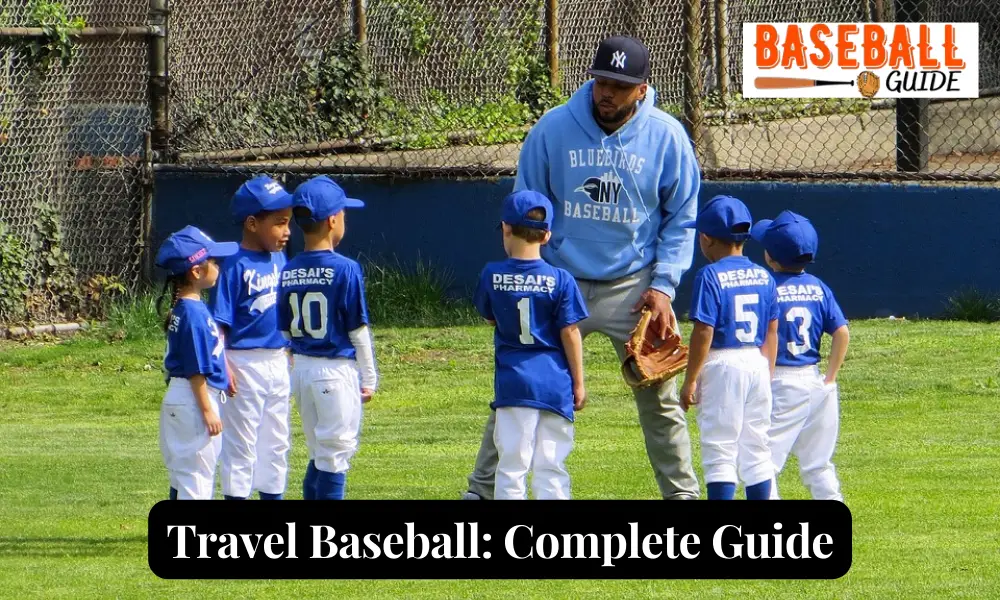
Do you want your child to be a great baseball player?
Are you a youngster who has finally realized that you want to take your baseball skills to the next level?
Or possibly both the parent and the kid are reading together, eager to learn more about improving their baseball skills and turning it into a more serious activity.
If you feel it to be a convenient strategy, participating in travel baseball may provide answers to all of your questions and allow you to accomplish all of your ambitions.
In this article, you will learn all you need to know about travel balls, from the fundamentals to the more advanced aspects.
What Is Travel Baseball?
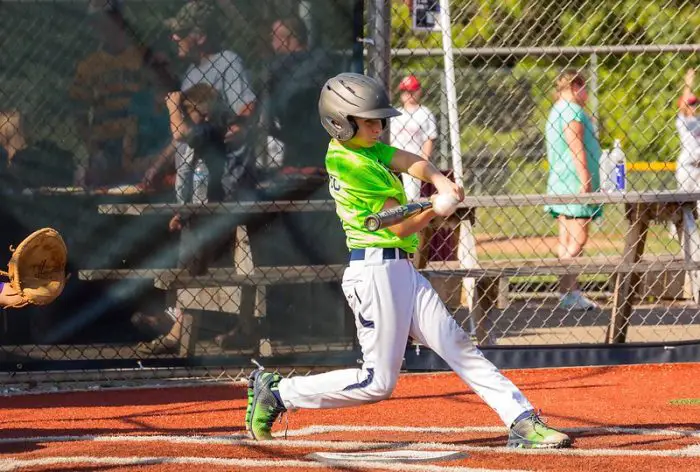
First and foremost, we must familiarize ourselves with the concept of “travel baseball.”
Typically, when people talk about travel baseball, they’re referring to a squad of elite players who participate in tournaments and train at their own facilities.
You may think of it as a sort of youth baseball in which games are played away from home.
Teams known as ‘ travel ball teams or travel teams ‘ in this form of baseball may travel to another state or city to compete in baseball travel tournaments.
Structure Of Competition
A tournament system is used for almost all travel baseball games, played on weekends.
Tournaments may potentially take place anywhere, although they are most often conducted in multi-field sites near major transportation hubs.
You can anticipate traveling more if you reside far away from such transit centers.
The final teams for the event are decided after each travel ball team has played several matches.
Depending on how well a team does, they may play somewhere between three to eight games throughout the course of a two-day or three-day tournament.
The number of tournaments a team may enter isn’t set; although two per month is considered normal, higher-level teams may play more regularly.
Level-Play In Travel Baseball
There are generally three categories of competition in a travel baseball tournament, ranging from the least developed to the most developed level of youth baseball.
This classification is according to Baseball Youth’s DivLevel classification system, which is a travel baseball’s national team division classification system.
1. Division 1 Or D1
Within Baseball Youth’s DivLevel categorization system, Division 1 or D1 is the top level of play.
D1 is better suited for teams considered Major/All-Levels of AAA, Gold, or Elite/Advanced in their respective leagues.
Teams in the D1 division should play the bulk of their games against regionally competitive opponents and/or nationally rated.
2. Division 2 Or D2
Within Baseball Youth’s DivLevel categorization system, Division 2 or D2 is the intermediate level of play.
Teams graded as Medium AA/High AA, Silver, or High-Level Intermediate are best suited to compete at the D1 level.
Teams in the D2 division should play the bulk of their games against other mid-level regional and local opponents in the same division.
3. Division 3 Or D3
Within Baseball Youth’s DivLevel categorization system, Division 3 or D3 is the weakest level of play.
Low AA/All-Levels of A, Bronze, or Low-Level Intermediate/Beginner teams are the greatest fit for the D1 level.
Teams in the D3 division should play the majority of their games against other domestic and regionally-based opponents in the same division.
Travel Baseball Against Little League
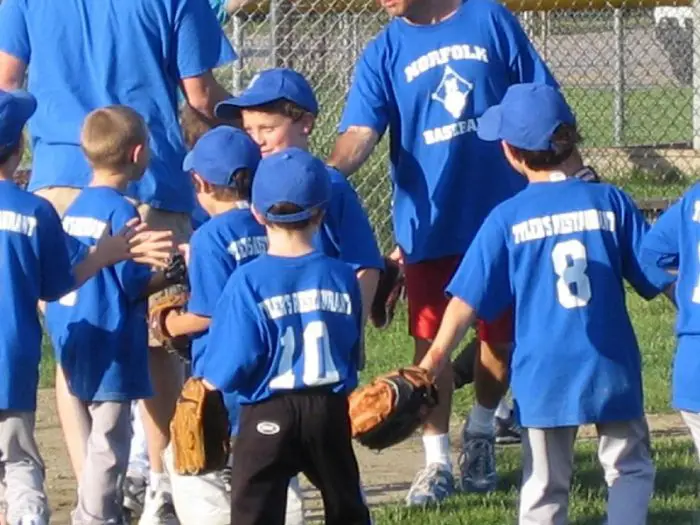
There are several significant parallels and distinctions between travel baseball and little league baseball .
Both aid in developing important life qualities such as a positive work ethic, sportsmanship, cooperation, and the ability to learn from mistakes.
They are, however, significantly different in terms of time investment and competition.
One is recognized for being competitive and raising your skill level, while the other is known for being recreational and a means for youth to learn the rules.
Travel baseball offers a higher competition level than what traditional little leagues provide.
In a single season, roughly 14-20 games are played in both.
There isn’t much difference between these two, other than the amount of seriousness and the fact that you’ll have to travel for a travel ball .
How To Get On A Travel Baseball Team?
As a player, being a member of a travel baseball team is a thrilling experience.
Following are a few pointers that can help you relax and perform at your best, making joining a baseball team much simpler.
1. Be On Time (Or Before Time)

First of all, plan to arrive a few minutes early. If you arrive late, you’ll have to hustle to keep up with everyone.
Arrive early enough to check in, go for a quick jog, play a game of light catch with a buddy, and ease up on your own.
2. If You Are A Baseball Player, Look Like One
Dress appropriately for tryouts; do not show up in jeans or oversized basketball shorts.
The ideal outfit consists of a clean pair of baseball trousers , a decent light sports shirt, and a nice hat worn with the bill facing front.
If you don’t have baseball pants available, a nice pair of sweatpants will do.
3. Practice Makes Perfect
You should play catch even if you only have time to do so twice or three times before the tryout.
If you’ve been to the tryouts previously and are familiar with a few of the activities they’ll be doing; it’s a good idea to put those skills into practice as much as possible.
Practice gaining leads , doing excellent leaps, and anything else you believe you’ll see during the tryout.
4. Play Your Usual
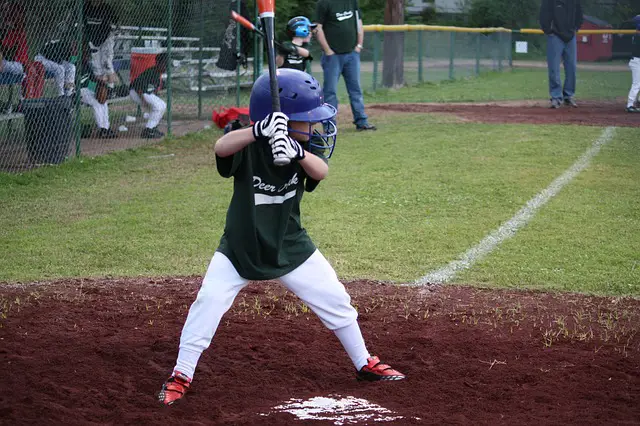
You should just play your game and allow the game to come to you; don’t try to force it.
Simply wait for the right chance to present yourself, and then boldly do your task to the best of your ability.
If you push too hard, you will almost certainly make more errors than you would otherwise.
5. Good Behavior
You’ll be a suitable candidate if you’re willing to work hard and take constructive feedback.
Have a sportsman’s attitude ; if you don’t catch the ball, ask the coach to throw it again instead of pouting.
Don’t be hesitant and hide in places, missing out on the chance to learn what you need to know in travel teams.
Also, remember to be kind to your teammates , motivating them when they make errors and communicating with them regularly while conducting the exercises.
Advantages And Disadvantages Of Travel Baseball
There are upsides and downsides to consider when it comes to travel baseball.
- Strong Competition: Travel baseball lets kids play with and against some of the finest players in their region and even beyond.
The players are more committed to the game and motivated to progress. Your child’s performance will be pushed to the limit by the increased level of competition.
- Improved Coaching: Coaches are frequently ex-players who have gone on to coaching careers in the sport.
There is a higher likelihood that a travel baseball coach will be better educated, more experienced, and more tied to the game.
- Fun Experience: Many weekends will be spent in hotels together, learning about new places and bonding as a group in a travel baseball team.
It’s one of the best ways for young people to go to new places around their region and the country, and they can do it while having an amazing time with their teammates.
- Easy Exposure: You can get a lot of attention from college and professional scouts by playing travel baseball.
One of the best things about being on a high-level travel baseball team is meeting other high-level coaches.
- Character Growth: The significance of travel teams about being on time, behaving well, and putting in the most effort makes a child more disciplined.
As young people move from Minor League Baseball (MiLB) to Major League Baseball ( MLB ), they already have the sense of urgency that they need.
Disadvantages
- Very Competitive: Travel teams take their games seriously and strive to win games.
A travel team must balance the development of its players while still attempting to win matches. This often results in players who aren’t the greatest not having a chance to play.
- Costly: Travel baseball is costly and sometimes extremely costly, which might be a reason for most kids to drop its idea.
- Prioritized Task: Even a reasonably competitive travel squad may consume a summer’s worth of weekends.
As a result, it is a time-consuming task that you must be able to prioritize.
Frequently Asked Questions About Travel Baseball
Some common questions about travel baseball are:

1. How Do Baseball Players Travel?

Teams may travel by bus if the shortest path between the two cities is less than 200 miles.
Anything longer than that necessitates plane travel , with all flights being nonstop.
Major airlines, which are generally among the team’s sponsors, charter flights for most MLB clubs.
2. When Does Travel Baseball Season Start?

The travel season is divided into two seasons: Yearly Season (Main) and Fall Season (Optional)
The yearly season starts from around April 1, ends in August , and is compulsory.
While the fall season spans from around September to the late part of October, which is optional.
3. Who Can Play Travel Baseball?
The 8-year-old squad, mostly composed of 2nd and 3rd students, is the first to go.
4. What Age Is Best For Transitioning To Travel Baseball?
Travel baseball would be a logical next step for children aged 11 to 12 (but not younger than that) who want to enhance their talents to the level of a professional player.
5. Is Travel Baseball Worth The Money

Whether Travel Baseball is worth the money or not depends on how serious you are about getting your skills to higher levels.
It gives extra opportunities for committed baseball players who want to get the most out of each year
6. How Much Does Travel Baseball Cost?
The exact cost of participating in travel baseball differs, but it typically costs somewhere around $500 and $2,500 per year.
Travel baseball is an effective way to enhance your skills and increase your chances of playing in college or as a professional.
But, do not overlook the expense and investment of time that comes along with the benefits travel ball gives.
Only the most costly team doesn’t need to make your kid adequately talented to join a team in college or select baseball as a profession, a fairly priced team may be similarly trained and qualified, so you need to get into a team thoughtfully.
After reading this article, I hope that you have a firm grasp of all of the technicalities surrounding travel baseball .
About The Baseball Guide
Follow Us on Social Media
Thebaseballguide.com is a participant in the Amazon Services LLC Associates Program, an affiliate advertising program designed to provide a means for sites to earn advertising fees by advertising and linking to Amazon.com. As an Amazon Associate, I earn from qualifying purchases.
Copyright © 2017 - 2023 Thebaseballguide.com - All Rights Reserved.
- Skip to main content
- Skip to secondary menu
- Skip to primary sidebar
- Skip to footer
BASEBALL~X~GEAR
Your Source For Everything Baseball!
Travel Baseball: A Guide For Parents & Players
Baseball has changed.
Well, not the game necessarily. The diamond is still the same dimensions, as is the distance from the rubber to the plate. But the way the game is played has changed – specifically at the youth level.

For decades, organized youth baseball was a seasonal sport, played on town diamonds under the banner of Little League Baseball. Each spring, kids would join their local league and play with their friends, against teams made up of kids from the same town, coached by a group of fathers. There was little travel, little intermingling. It was a local sport, unless you made the All-Star team.
Youth baseball was based around recreational leagues , with little emphasis put on the competitive nature. There was a set schedule, with spaced-out games and a hyperlocal focus. It was just a spring sport, one of many sports played by youth across America.
Now, things are different. Kids who play baseball have a chance to forge their own path, to take part in more than just recreational leagues played in the springtime. The recent introduction of youth travel baseball has made it easier for young players to specialize in the sport that they love, focusing on their development on a team that plays throughout the year.
Travel baseball can be difficult to get involved in. Many times, there is anxiety surrounding it, with questions that are hard to answer. Is it worth it? How much travel is involved? What team should my child join? What will he gain from it?
We’re here to break it down for you, uncovering some of the secrecy surrounding travel baseball.
What Is Travel Baseball?
Travel baseball is a relatively new way to play. Until recently, travel teams only existed in parts of the country that were baseball hotbeds – places like Florida, Southern California and Virginia. Only elite players took part, the best of the best, and it was focused on the upper levels of youth baseball, where scouts could get a better look at developing players, gauging their professional prospects.
It was intended to be more of a showcase for older players, but in the last twenty years, baseball at the youth level has evolved considerably. Now, travel baseball is almost a necessity for any player that’s looking to hone their skills and be serious about baseball. Instead of being a place for a young player to showcase their skills, it has become a place where a younger player can develop, can receive specialized instruction. It’s also a way to face an increased level of competition.
Travel baseball isn’t a monolith. It goes by several different names: select ball, club ball and premier ball. There are several different governing bodies, including USSSA , Perfect Game, AAU and Triple Crown Sports. But each team has something in common: the structure of its season.
Instead of being focused on individual games, spaced out through the week with practices and off-days, a regular season and postseason, travel ball is centered around tournaments.
Most of these tournaments happen on the weekends. Teams can play several games each day during a tournament, sometimes against teams from different governing bodies. These tournaments are not always local, as some of the best teams travel across the country to compete, while others prefer to stay closer to home.
Teams in travel ball can be started by anyone. Sometimes they’re started by a baseball academy, while other times they’re started by a group of parents looking to branch out from a Little League. Some teams have squads in each age bracket, for each level of baseball ability, while others are the only team to bear their name.
It must be noted that due to its competition structure, travel baseball is pay-to-play. Entering tournaments costs money, as does renting batting cages and getting field time. Thus, travel baseball costs money, which to some people, is a deal breaker.
How Much Does It Cost?
Here’s the short answer: it depends.
What does it depend on? The structure of the team, the level at which it plays, and the travel that’s involved.
Sometimes, those fees are high, in the thousands each year. This is mostly confined to teams at the elite level, teams that travel frequently and enter tournaments with top-tier squads. And while parents may fork out thousands of dollars for their child to play, that amount doesn’t include travel costs. Those will have to be paid for out of pocket, especially for parents who want to see their child play in far-away states, where high-level tournaments are held.
However, for teams that travel locally, have volunteer coaches and enter less expensive tournaments, the costs can be exponentially lower, in the hundreds each season.
So why fork over all that money? Why should your child play this type of baseball? Because, it has its advantages, many of which lead to increased developmental opportunities that a young player would otherwise miss out on.
What Are The Advantages Of Travel Baseball?
There’s a reason travel baseball is so popular among parents and players alike. Playing baseball for a club team can help younger players develop more and specialize in their favorite sport by playing it year-round. But structurally, it provides a number of advantages over regular baseball.
Here are a few advantages that travel baseball provides:
- Better coaching
- Increased competition
- Specialized training
- Team bonding
- Increased exposure
Better Coaching
The old cliché about the typical Little League coach is that he’s the father of a player. In his mind, his kid is the star of the team, even if that’s not the case on the field. The coach probably played some baseball growing up but doesn’t know the technique or the strategy that the coach at the local high school does. He isn’t paid, nor is he all that experienced.
Travel baseball differs in that it offers players the opportunity to learn from coaches who are more focused on development. Many travel-ball coaches have coached for years and some even offer private lessons on the side. Sometimes, teams even have a fulltime coach who is paid strictly to coach the younger players.
Because the coaches are more experienced, the players get better teaching. Hitting practices can be spent refining a certain technical part of the swing. Players who develop a mechanical flaw can work with a coach to fix it quickly. Coaches can look at a player’s skillset and marry him to a position, focusing on the little aspects of that position that matter the most.
Some teams even have a full staff of coaches – a pitching coach, hitting coach and a manager. This means players become more polished and can harness more of their raw ability earlier. It means that they can unlock hidden potential from a coach that can teach them how to get more break on a curve or add a little juice to their fastball – something that they wouldn’t have been able to do in a recreational league.
Increased Competition
Recreational leagues have a low barrier of entry. While this is great for encouraging a passion for the game, it’s not always a great setting in which to develop. Players come from all skill levels and for some, it’s their first time holding a baseball.
What about players who want to specialize in their sport, who know early on that they want to be the best they can be at baseball? What good do they get from playing someone who doesn’t want that – someone with less experience and less polish? What good do they get from someone who is rusty around the edges and can’t throw strikes?
Not much, that’s for sure.
That’s why travel ball is such an advantage for most younger players – because it consists of players with a like-minded mindset, most of whom are focused on their development. That means that players are more polished, that curves have sharper breaks, and those infield grounders are converted into outs more often than not.
The old saying is that if you want to be the best, you have to face the best. That’s why travel ball can be so valuable to younger players – they can gauge their abilities against the best competition and see how they stack up.
Additionally, many teams have “B” and “C” teams. While these teams may not face the best of the best, they’re great for players who are still developing their talents. That’s because those players can face talent at their level as they refine their game, maintaining their confidence and focusing on what they need to improve and sharpen going forward.
For what it’s worth, I had to play on one of those “C” teams one season, as I worked on my skills behind the plate. For me, it was great, because I got to work on my approach behind the plate and focus on positivity. It really did wonders for my game, in the long-term timeline, because my confidence was high going into the next season, when I rejoined my regular team.
Specialized Training
I’m huge on specialized training, especially when it comes to fielding. Really, this advantage of travel baseball is an outgrowth of the advanced coaching one receives, but it is so, so critical in order to become a great player.
While often overlooked, fielding is key to become a well-rounded player. And as a former light-hitting outfielder, I can attest to the fact that it can be a way to get noticed and get playing time, even if you don’t hit well.
Some of the best training I received in travel ball was fielding training that focused on footwork in the outfield, leading to better routes taken to fly balls and ultimately, better range. It was highly technical training, something that I doubt I could have received elsewhere.
For catchers and pitchers, this is especially true. Catching is something that is hard to teach in recreational ball – you either have it or you don’t. But in travel ball, catchers can focus on honing their craft during practices, working newly created drills that really help receiving and controlling runners.
Because a lot of travel teams have their roots in baseball academies and developmental centers, it is easier to get sidework in, and field time is also easier to obtain. That clears a major hurdle when it comes to developmental work.
Team Bonding
In recreational leagues, you’re playing with your friends and acquaintances. It can be cool, since most of y’all go to school with one another and grew up playing together. However, those bonds are not as strong as the ones forged in travel ball.
Because of the sport’s nature, with intense training, many hours spent together, and yes, travel time, the bonds forged by club ball are stronger. The atmosphere sometimes mimics that of higher levels, as players share the same buses and hotel rooms on trips.
Interpersonal bonds are formed by time spent together and a shared sense of purpose, often in the face of adversity. In travel ball, where weekend tournaments consume free time and practice is held most days, there’s plenty of that to go around. With shared interests and a focus on development, players have more in common – thereby making those bonds easier to forge.
Sports create lifelong friends, and travel ball is a testament to that.
Here’s a shocker, one that you may not have noticed yet: in travel ball, teams get the opportunity to travel. Crazy, right? Anyway, one of the big advantages of travel baseball is the opportunity to go beyond the local sandlot, even if it’s just locally. Some of the smaller teams focus on limited travel, never going more than a few hours out of their way, but that still affords a younger player a chance to see other parts of the country, a chance to get out of the confines of their own backyard.
Other teams travel more – around the region or even nationally. This gives players a chance to really broaden their horizons, but it’s also very exciting. There’s something special about going to a tournament two states away to prove your worth. For a younger player, it’s fun to spend time with teammates in hotel rooms – almost like a short vacation during the time off.
For parents, it can be fun too. Many of these tournaments are hosted in centrally located cities, where amenities and attractions are plentiful. For example, Orlando commonly hosts these tournaments because it is centrally located, with an excess of fields.
Local tournaments can feature more than just baseball there, as parents and players alike can visit one of the city’s amusement parks.
Increased Exposure
This one is for the players at higher levels. At the summit of club baseball, it can still be very much as it was in its early days, where showcases of talent are the main priority. Organizations like Perfect Game provide weekend-long tournaments dedicated to players who want to be seen in front of major league scouts. They take time to go through a combine, showing off their bat, arm, glove and speed, before taking part in a few games.
Plenty of folks are watching, from college coaches to MLB executives. And they’re all looking for the next big thing.
That kind of exposure is something you can’t get in high school ball, where the rosters are less talent rich. By consolidating so many pro prospects, it becomes a must-see event, one in which a player who puts together a good showing can go from a non-prospect to a prospect.
Is It For You?
Ultimately, the decision to play club baseball is up to individual families. They must weigh the advantages against the costs and the time that must be spent to make such a commitment.
Related Articles
- Comparing Youth Baseball Leagues
- Travel Ball vs Rec Ball
- Youth Fall Baseball
A lifelong baseball fan, Jacob Prothro has covered all levels of baseball for MLB.com, The Wichita Falls Times Record News and Rivals.com. Prior to that, he was a light-hitting outfielder in the Texas high school ranks. In his free time, Jacob roots for the San Francisco Giants and plays in a men’s league, where he still hasn’t figured out how to hit a curve.

About Me Ask Jeremy Contact Me Terms of Use Disclosure Privacy Policy
Baseball Information & Resources Baseball Rules & Plays Learn to Play Baseball Youth Baseball Baseball Gear & Equipment
- International edition
- Australia edition
- Europe edition

Travel baseball: a world where eight-year-olds are treated like pros
Swearing in the stands, long days of travel and night games. Sometimes junior baseball looks more like the big leagues
A baseball player strikes out. Disappointed, he turns to the stands where he makes eye contact with a man who yells, “ WHAT A WASTE OF A SPACE.” The player slowly walks back to the dugout, his head hung low, a routine he seems familiar with. He is isn’t a major league superstar like Anthony Rendon, George Springer or Mike Trout, accustomed to the wrath of impatient fans. He is an eight-year-old boy and the disgusted fan is his father who, based on his body language, might as well have yelled, “What a waste of a life.”
This happened a month ago in a midst of an under-nine tournament as we waited for my son’s game, which happened to be against the kid with the angry father. I wanted to hug that kid or at least compliment him in front of his dad. That wasn’t necessary. His team demolished ours and the boy walked away with his father, who looked a little less incensed than he had a couple of hours prior.
The night before, I learned about a parent from a different team. He wore a shirt that read, “FUCK OFF”, and took a swing at a parent from our team for politely pointing out the inappropriateness of his attire. This was a youth baseball tournament sprinkled with players as young as six. Fuck Off Guy was given a proverbial Fuck Off when he was escorted out of the complex, a baseball Disneyland called Big League Dreams that hosts weekly tournaments and makes gobs of money in the process. There are beautiful fields and two bars. Apparently watching your kid play sports is better when buzzed.
That weekend was our first full-scale experience on the youth baseball travel circuit, a baseball business that presents kids as young as seven with a chance to compete at a theoretically higher level of competition by participating in regular tournaments. A key part of the US’s $15bn youth sports industry, these travel teams often come with hefty price tags that automatically excludes many families. It was a contrast to the league we had played in the previous summer. There, my son was selected to a team of the best players in our local baseball league. We participated in three tournaments that were sweet, community-based annual events. Kids ran the snack shacks, there were trophy presentations for the winners and plenty of local pride was on show. The whole thing was so innocent it felt like it was played to the soundtrack of John Fogerty’s Centerfield .
A far different animal, last month’s tournament was just one of many for a company that runs tournaments every weekend all year long, trying to squeeze in as many teams (and their entry fees) as their permits allow. Our tournament involved 10 teams, and we started one game after 8.30pm. By the time my son came in to pitch, it was 10.17pm, 107 minutes past his bedtime.
There is no parenting manual that differentiates between the glorious aspects of youth baseball and the predatory ones. No one can fully explain how youth sports can monopolize your world until you’re in it. And, for better or for worse, we’re officially in it.
My eight-year-old son is a multi-sport athlete. It’s ridiculous to refer to him as an “athlete” since he’s really just a third-grader obsessed with body-part jokes and his fantasy football team. But he plays soccer and baseball competitively and he’s good enough at the latter that he’ll probably be playing for the foreseeable future.
I’m one of those parents who is not only interested in her kids’ endeavors, I want to participate unless they tell me to get lost. So despite the fact that I never played softball or baseball as a kid and eschewed most organized sports for the performing arts, I have transformed into a hardcore baseball mom. I learned proper glove mechanics, the throwing motion and youth baseball rules so I could participate in the thing he loves most, which thankfully is baseball and not base jumping. Just yesterday, my son made my heart burst when he said, “you’re awesome at baseball … for a mom,” which was almost as gratifying as the follow-up, “I love that you play baseball with me.” It seems logical but I can’t emphasize enough the magic of interacting with your kid on his turf.
Committing to a travel team requires drastically altering your life. Multiple practices a week are just the start. If you have a two-sport athlete like I do, it means tournaments every weekend, hotels, expenses – something we are lucky enough to be able to afford – and making sure siblings are sated. When the stars align like they have for us and the parents are amazing and your kid becomes instant friends with his teammates, you indulge in everything because you suddenly have a baseball family.
If my kid decided to walk away from travel baseball tomorrow, I would be devastated, but also aware that my number one job is to support my children. Not every kid has that luxury. I polled several friends with sporty kids on the travel circuit, and many have been witness to parents who seem to care more about youth baseball than their kids do. Some are simply trying to relive their glory days (or construct glory they never had); other parents from certain socio-economic backgrounds view a baseball as their child’s only viable path to college and see youth baseball as a training ground for a scholarship. No wonder, for some, every game feels like life or death. This of course can lead to detrimental team dynamics as parents gossip or aggressively lobby coaches for playing time. I can’t even imagine that type of in-fighting among our baseball crew, but our kids are only eight and nine. Who knows if in five years one of us will go postal if a coach makes a decision that we feel unfairly harms our kid’s trajectory?
For now, I am laser-focused on protecting my son against the outside forces who care about what they can squeeze out of him. Last summer, my son was invited to play on a travel team – he could even make it without a tryout, the coach said. When we politely declined citing concerns about burnout, the coach said my son is the type who will never burn out because he loves baseball so much. He was pleasant about the whole thing and we eventually joined his fall travel team, largely because my son likes him and a ton of his friends signed up. But I’m concerned about fending off future invites.
The future scares me. I don’t want my son’s joy to wane. But I know there will be more recruiting, more join-this-or-that-or else-your kid may fall behind sales methods.
I dropped my five-year-old off at an after-school class a few weeks ago and had a coach ask me if my eight-year-old would be participating in their “winter workouts”. I said no, that we didn’t want to burn him out. The coach looked at me like I was torturing my child, and simply uttered, “I hope he doesn’t get too rusty.” I smiled on the outside and rolled my eyes on the inside. Then I left to pick up my kid and meet my husband at a local park where we all played catch for the next hour. Like we always do.
- Parents and parenting
Most viewed


Travel Baseball: Pros and Cons
We are reader supported. When you purchase through links on our site, we may earn an affiliate commission. Also, as an Amazon affiliate, we earn from qualifying purchases.
Travel ball is one of the most popular forms of competitive baseball in the United States, and it is only growing in popularity. It can start as young as six years old and go all the way up to 18.
Travel ball consists of teams that are independent of any amateur league, school, or organization that travel to tournaments locally, regionally, and/or nationally to compete against other travel teams.
As more kids each year are taking advantage of travel ball opportunities, more and more parents are considering travel ball as an option for their child to improve his baseball skills. Before committing to travel ball though, one must weigh the pros and cons.
Pro: Competition
Travel ball teams are notoriously more competitive than rec league and sometimes even high school teams . Because travel ball teams are able to recruit the best of the best in their city, state, or region, teams are typically more talented.
This allows players to play with peers who share their passion and talents for the game. Also, it gives them the opportunity to play against peers with equal or greater skill than themselves. This allows them to push themselves to become better players.
Players who typically dominate rec leagues and high school games should consider travel ball as an option to play against better competition.
At the youth level, parents sometimes opt to play a full season of travel ball and skip little league altogether. This can be controversial as some believe that doing this is unfair to the community leagues, but it often benefits the player and challenges him to improve.
At the high school level, players often use travel ball to supplement their high school season. They play in the summer and sometimes fall when their high school team is not in season. Very rarely does a high school player opt to only play travel ball.
For players who struggle in little league or high school, travel ball may not be the best option as the competition may be too much for them. Their confidence in their abilities may suffer making it counterproductive.
For any amateur player looking to play with and against better players, travel ball is a great opportunity to do so.
Pro: Exposure
One of the main reasons many high school baseball players with hopes of playing college ball decide to play travel ball outside of their high school seasons is the exposure they may get because of it.
Most of the time, college and high school baseball seasons overlap leaving little time for college recruiters to get out and see players. High school travel ball normally takes place during the summer while colleges are not in season. This gives them more opportunities to be seen.
Also, many high level travel teams have systems in place to afford players the best opportunity to earn interest from college coaches. Many travel coaches have connections with college recruiting coordinators, so they often reach out on their players’ behalf to get them on recruiters’ radars.
More competitive travel teams also play in a lot of tournaments hosted by companies such as Prep Baseball Report and Perfect Game. These are scouting services devoted to helping high school players find colleges and for colleges to find talented prep players .
At these tournaments, players’ stats and measurables are recorded and added to their recruiting profile for college coaches to see. They also sometimes record videos that they share on social media.
Playing travel ball is not the only way to gain exposure in front of college coaches, but it is one of the more effective ways to play in front of recruiting coordinators.
Pro: Relationship Building
Travel ball also has non-baseball-related advantages.
Travel teams are normally made up of players from different areas of a particular city, state, or region. This affords young kids the opportunities to develop friendships with other kids outside of their hometown.
This allows them to broaden their horizons and experience things outside of the perspective of their hometown. Sometimes, players will form lifelong friendships with kids they never would have met outside of travel ball.
Not to mention the relationships that can be formed from a parent’s point of view. Sometimes, the adults of the children on the team can form lifelong friendships that otherwise may have never had a chance to develop.
Pro/Con: Playing Time
Yes, believe it or not, playing time is both a pro and a con when it comes to playing travel ball.
The positive side of it is that playing time is easier to come by in travel ball. Teams are often made up of anywhere between 9-12 kids to ensure that everyone gets enough playing time .
For coaches, it is important to evaluate the talent level of both your team and the players on your team. Ideally, they should all be about equal in talent level with maybe a few outliers who clearly have more talent than the others.
If a team has nine players that are head and shoulders above the talent level of the remaining two or three players, it will be difficult for a coach to get those two or three players in the game therefore leaving an unequal amount of playing time.
Parents let their children play travel ball in hopes that they will develop their skills, and those skills can only be developed through ample playing time. Most of the time, travel ball teams offer players that opportunity.
On the negative side of things, some people believe that this creates a false sense of security in young players. As competition against other teams is increased through travel ball, competition in playing time is decreased.
Some high school coaches feel that their players expect to start every game regardless of their talent level or their work ethic thanks to travel ball. This even leaks into the minds of their parents as well.
When they go from playing on travel teams where playing time is guaranteed to playing for their high school team where the best nine players get to play, they have a much more difficult time accepting a role as a bench player.
To combat this, travel coaches should make both players and parents aware that while their child may be guaranteed playing time on his travel team, that will not be the case in high school . While this may not solve every problem, it may help clear up any misconceptions.
Con: Coaching

Some travel teams have coaches with lots of playing and coaching experience and take their job as coaches very seriously in helping to develop players’ skill sets.
However, one of the biggest complaints about travel ball is that there is often not enough focus on player development . Coaches just put together lineups and let the kids play.
Sometimes, as is the case in younger levels of travel ball, coaches are parents who may not know as much about the game but are willing to spend time organizing practices and tournaments for the kids.
Also, parent-coaches can sometimes muddy the waters when it comes to playing time. If others feel the coach’s son is getting special treatment, it could cause friction among the team.
Any parent who volunteers his time to coach a travel team should be commended, but he should be prepared for complaints from other parents if his child gets more playing time than other players. It doesn’t always happen, but it is certainly a possibility.
To combat this, some travel teams hire a third party to come in and coach the team. These are often younger coaches who are looking for extra income and ways to get started in coaching.
There are some great travel team coaches out there, but for every good coach, there are many more who struggle.
Probably the biggest complaint about travel ball is the cost to play.
Travel baseball costs on average about $3,700 per year. It is not unusual for parents to pay close to $10,000 for their child to play on a travel team.
Before complaining about the cost, remember that travel teams are not affiliated with any leagues or organizations, so they are on their own when it comes to uniforms, equipment, tournament fees, umpires, coaches (sometimes), hotels, etc.
The typical travel team is not for the family who struggles to pay the bills each month. However, there are travel organizations with sponsorships that pay for most everything for the players. The only downfall is that these teams are typically exclusive to players with elite talent.
Some teams opt for fundraising efforts to charge parents as little as possible for their players to play on a travel team. Either way, parents should expect to fork up some money for their child to play travel ball.
Con: Length of Season
Another criticism about travel ball is the number of games the teams play. Some youth travel ball teams start in early April and play every weekend all the way up until Labor Day weekend.
If a team followed that schedule and played at least three games each weekend, that would be 66 games over five months . Three games is the minimum most teams play in a weekend. It is sometimes as many as six or seven.
This is the reason many kids get burned out on the sport before they even reach high school. They simply play too many games too early in life.
High school summer teams usually don’t start until June because of the high school spring season, but they are notorious for playing anywhere between three and five games per weekend the whole months of June and July and even some of August.
That’s about 8-10 weeks worth of games and can be anywhere from 30-50 games on top of whatever their high school teams played.
Not only can playing that many games lead to early burnout, it also puts young players at a higher risk for injury — especially pitchers.
Related Questions:
How does travel ball compare to little league.
Little League is an organization that was founded in 1939 that operates in more than 80 countries. It is the governing body for many community run youth leagues for ages 6-12. Travel ball is not an organization itself. Tournaments are run by individuals or groups that are not tied to Little League at all.
Travel ball is typically viewed as more competitive than Little League as teams are not restricted to playing against their local competition. Also, travel ball begins at age six and can be played all the way up until age 18.
How do I choose a travel ball team?
When choosing a travel ball team, players and parents should have in mind what it is they hope to get out of playing travel ball. Then, they should take that list and try to find a team that can provide them those opportunities.
Some teams require players to try out for their team while others simply use word of mouth recommendations from people they trust when finding the players that are fit for their team.
What age should I start a travel team?
Travel teams can start as early as six years old and go all the way up to 18 years old. Six is pretty young to start playing on travel teams, but many people do it.
Instead of using age as a determining factor for starting travel, ask this question: “Am I serious about baseball, and am I ready to take my game to the next level?” If the answer to both of those questions is yes, then it may be time to look for a travel team.
When should I leave a travel team?
Leaving a travel team is something that should be avoided because players do not want to get a reputation for jumping from team to team.
However, there are times when it is necessary. If the team is not providing a player with the opportunities to get better, it may be time to leave that team. It is also best not to leave the team in the middle of the season as that leaves them in a bind trying to fill the vacant spot .
See Also : BBCOR vs. USSSA: Here Are Difference What is the Average Velocity of a Division 1 Pitcher? How Long Do High School Baseball Games Last?
New England Baseball Journal
Travel ball coach: 5 tips for new club baseball parents
Each year, thousands of players begin their first experience into travel baseball, but the new experiences aren’t just limited to the players. It can be just as educational for new parents in the space.
Here are a few tips to have a great experience as a new travel baseball parent.
Don’t hover
Whether it’s at indoor winter practices or approaching the dugout during a game, keep your distance. As a coach, there is nothing worse than a parent who wants to be in the action on the sidelines when trying to keep your players engaged. It can change the way that a coach approaches practices if he or she has to have an audience of parents hanging over his or her shoulder. Further, if your kid needs you, tell them to come and find you where you are sitting. Coming over to the dugout with mid-game pointers is a no-no. The dugout is a sacred place. Stay away.
Don’t yell at the umpires
In a society where everyone has a camera (and opinion), being an umpire is increasingly difficult. It’s the biggest problem in youth sports, and each parent needs to take it upon themselves to change the way people treat umpires.
One parent can change the whole day at the field by acting like an idiot. Don’t be that parent.
Ride the wave
There are going to be some tough weekends.
The first weekend can sometimes be the hardest for many parents. After a winter in which you likely receive only positive reports on development from your child, it can be a tough pill to swallow to see them struggle out of the gates.
News flash: Baseball is hard! They are going to struggle.
Know that your children are never as good as you think they are, and never as bad as you think they are.
Invest in your experience
You’re going to be at the field a lot! Treat yourself. Buy a nice chair, buy a nice travel cooler. Travel in style!
It’s worth it when you are at a random field for six hours, sometimes twice a weekend. Find something that makes the experience better for you as it’ll only help your child.
The 24-hour rule
This might be the most important tip I can give any parent in travel baseball.
It’s a long season. There are going to be highs and lows, conflict, sometimes tears. There will likely be a time when you feel the need to reach out to your coach or program director about playing time, player handling, substitutions, etc.
Always give it 24 hours after a game before contacting your program representative. Stay away from immediate social media rants. No one wins in those situations.
But if you do anything, give it a day, let the emotions come and go, and then articulate your concerns. It’ll be very much appreciated by the recipient.
Mondays can be the most painful days for travel baseball coaches and directors as there will inevitably be concerns raised from the weekend. Take the emotion out of it by allowing yourself to cool off.
These are a few tips to help get you as a parent off to a fast start. You’ll be an expert in no time.
The ultimate goal is for your child to continue to develop and be as excited as possible to do it again the following year. A big part of your child’s experience is a reflection of their parents’ experiences.
Follow these tips and lay the foundation for your child to have a great start to a travel baseball career.
Related Articles
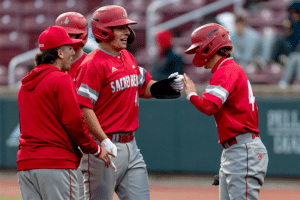
Travel ball coach: Freshmen, start by being a great teammate

NEBJ MLB awards: Impactful seasons from New England pros

How freshmen can earn trust of college coaches to get on field

Our Free Weekly Newsletter
- Notice at Collection

Travel Baseball In Wyoming Interrogated: How To Get The Excitement You Want?
Introduction to Travel Baseball in Wyoming Welcome to the exciting world of travel baseball in Wyoming! If you’re a dedicated parent or coach looking to

Is There Travel Baseball In Wisconsin? Yes, It Is Thrilling And Inviting.
Welcome to the world of travel baseball in Wisconsin, where young athletes embark on an extraordinary journey of growth, dedication, and passion for the sport.

Interested in Travel Baseball in West Virginia? This is Superb Reading.
Welcome to the world of travel baseball in West Virginia! In this tight-knit community of dedicated parents and coaches, we embark on a journey filled

Travel Baseball In Washington? The Stunning World Of Competitive Baseball
Travel baseball in Washington is more than just a sport, it’s a journey of dedication, sacrifice, and growth for young athletes. As a dedicated community

Travel Baseball in Virginia is Rewarding. Find Success Here.
Travel baseball in Virginia transcends sport. Indeed, it’s a lifestyle for devoted parents and coaches. They invest deeply in their young athletes’ journeys. The journey

Travel Baseball in Vermont? Here is How to Soar to the Top.
Welcome to Vermont’s travel baseball world! Here, parents and coaches form a dedicated community. Together, we embark on an emotional journey. We witness our young

Travel Baseball in Utah? Highly Recommended. Spectacular Teams and Talent.
Welcome to the world of travel baseball in Utah, where young athletes embark on a journey of growth, dedication, and dreams. In this close-knit community

Travel Baseball in Texas? Everything is Bigger Here. Take Pride in Baseball Paradise.
Travel baseball in Texas leads young athletes into an exciting journey of growth, determination, and endless possibilities. Additionally, in the Lone Star State, dedicated parents

Travel Baseball in Tennessee? Here is the Brilliant, Powerful Guide.
Welcome to the thrilling world of travel baseball in Tennessee! In this article, we’ll explore the emotional journeys, sacrifices, and immense joy experienced by dedicated

Your Ultimate Guide to Travel Baseball in South Dakota? Here it is.
Welcome to the world of travel baseball in South Dakota, where passion, dedication, and the pursuit of excellence collide on the diamond. As a dedicated

Ready to Discover Travel Baseball in South Carolina? Irresistibly Awesome.
Welcome to the exciting world of travel baseball in South Carolina! Whether you’re a dedicated parent or a passionate coach, this is where dreams are

Travel Baseball in Rhode Island? Small but Powerful!
Welcome to the exciting world of travel baseball in Rhode Island! In this vibrant state with a rich youth baseball history, dedicated parents and coaches

Travel Baseball in Pennsylvania is Life. Discover the Fascinating Truth.
Welcome to the exciting world of travel baseball in Pennsylvania, where young athletes have the opportunity to take their game to the next level. Travel

Exploring Travel Baseball in Oregon? Heart. Ambition. Enjoyment.
Welcome to the world of travel baseball in Oregon, where the thrill of the game meets the dedication and support of a vibrant community. As

Want More Info About Travel Baseball in Oklahoma? Expert Instruction is Here.
Welcome to the dynamic world of Oklahoma travel baseball! As a dedicated parent or passionate coach, you’re in for an exciting journey. This guide is

Travel Baseball in Ohio? A Nice Double Down the Line!
Welcome to the exciting world of travel baseball in Ohio, where young athletes embark on a journey of growth, development, and endless possibilities. Travel baseball

What Helps Make Travel Baseball in North Dakota Outstanding?
Welcome to the exciting world of travel baseball in North Dakota! Whether you’re a dedicated parent or a passionate coach, this is the place where

Travel Baseball in North Carolina? A Wonderful Players Paradise is Here.
Welcome to travel baseball in North Carolina! Firstly, if you’re a parent or coach, this is your haven. North Carolina boasts a thriving baseball scene.

Travel Baseball in New York? A Unique Wealth of Experience.
Welcome to New York’s travel baseball world. Here, young athletes embark on a thrilling journey. They compete and grow significantly. Travel baseball, also known as

Want to Learn About Travel Baseball in New Jersey? Welcome to the Truth.
Welcome to travel baseball in New Mexico. Here, young athletes elevate their skills. Additionally, they embrace competition’s thrill. From Rio Rancho to Albuquerque, talented teams

Welcome to Travel Baseball in New Jersey. Ready for the Truth?
Travel baseball in New Jersey elevates young athletes’ skills. Additionally, it offers higher-level competition and exposure to scouts. Players of all ages and skills find

Travel Baseball in New Hampshire? Powerful. Built Out of Granite.
Understanding Travel Baseball in New Hampshire Travel baseball in New Hampshire offers a unique opportunity. Young athletes enhance their skills and compete at high levels.

Travel Baseball in Nevada? Always Entertaining. Never an Enormous Gamble.
Travel baseball in Nevada sharpens young athletes’ skills. Moreover, it allows competition at higher levels. Additionally, players chase their dreams on the diamond. Nevada boasts

Travel Baseball in Nebraska Encourages Certified Development and Growth First
Travel baseball in Nebraska showcases young athletes. Importantly, it nurtures their talent. Additionally, it elevates their game. Programs like Prodigy Baseball Academy offer high-quality coaching.

Know How to Find Travel Baseball in Montana? Easily with This Guide.
Travel baseball in Montana offers excitement. Young athletes compete regionally and nationally. They enhance their skills. Clubs and teams span the state. Players showcase their

Travel Baseball In Michigan is Certified Excellent. Here is Proof.
In Michigan, travel baseball thrives. Additionally, it’s highly competitive for youth players. The Michigan Baseball Network on Facebook stands as a trusted resource. Consequently, parents

Travel Baseball in Missouri. How Does it Compare? Don’t Doubt It.
Welcome to Missouri Travel Baseball! Here, young athletes start an incredible journey. They hone their skills, face challenges, and experience joy. Teams range widely, including

Want to Play Travel Baseball in Mississippi? Compare Your Options.
Travel baseball has become a game-changer. Specifically, in Mississippi, it offers a unique experience. Players, parents, and coaches alike benefit from it. Skill development and

Ultimate Guide to Travel Baseball in Minnesota? It’s Right Here.
Welcome to Minnesota’s travel baseball world. Here, young athletes start an incredible journey. They experience physical and emotional growth. In this dynamic environment, parents and

Is Travel Baseball in Massachusetts Right For You? Be Absolutely Certain.
Welcome to the exciting world of travel baseball in Massachusetts! For parents and coaches, this journey is a labor of love, full of sacrifices and

Is Travel Baseball in Maryland Right For You? The Benefits are Huge.
Welcome to the exciting world of travel baseball in Maryland! Are you a dedicated parent or coach? Do you seek growth opportunities for young athletes?

Travel Baseball in Maine? Get The Ultimate Guide Here.
Travel baseball in Maine has surged in popularity. Consequently, young athletes showcase their skills in competitive leagues. Clubs such as Coastal Riptide and Maine Lightning

Examining Travel Baseball in Louisiana: How to Get The Experience You Want.
Travel baseball thrives in Louisiana. Young athletes showcase their skills here. They also pursue dreams and gain experiences. Louisiana has a rich youth baseball history.

Travel Baseball in Kentucky? Restoring Magic to the Field
Travel baseball thrives in Kentucky. Young athletes find a competitive stage here. The state boasts a rich youth baseball history. A passionate community supports the

Proudly Introducing in Travel Baseball in Kansas. See Something Special.
Travel baseball in Kansas offers young athletes the opportunity to take their baseball skills to the next level. With various clubs and programs throughout the

Interested in Travel Baseball in Iowa? A Future Prospect’s Paradise.
Travel baseball in Iowa is highly competitive. It’s an organized sport form. It helps young athletes advance their skills. The program is specialized. It goes

Travel Baseball in Indiana? It’s a Fierce Way of Life
Welcome to Indiana’s exciting travel baseball world! This guide is comprehensive. It takes you through Indiana’s thriving baseball scene. Dedicated coaches and volunteers abound here.

Travel Baseball in Illinois? Recommended Reading for Rewarding Results.
Welcome to the world of travel baseball in Illinois! In this article, we will take a journey through the rich history of this beloved sport

Is There Travel Baseball in Idaho? Yes, It is Robust and Thriving.
Travel baseball has seen a significant rise in popularity across the country, and Idaho is no exception. With the game of baseball capturing the hearts

Travel Baseball in Hawaii? The Sincere Joy of Pōhili
If you play travel baseball in Hawaii, you know pōhili means baseball. But more than that, it’s the pure, sincere joy of playing on the

Play Travel Baseball in Georgia? The Passionate Truth.
In Georgia, travel baseball has become a thrilling, yet challenging, journey for young athletes and their dedicated parents. The state offers a fertile ground for

Travel Baseball in Florida? Your Guide to Baseball in Sunshine State.
Travel baseball teams in Florida provide a pathway for young athletes to develop their skills and compete at higher levels. These competitive youth travel baseball

Travel Baseball in Delaware? Quality Teams Fill the State.
Travel baseball in Delaware has a rich history of development and growth. It all began with the introduction of travel baseball teams in the area,

Competitive Travel Baseball in Connecticut? It’s Easy to Find.
Travel baseball, also known as club baseball, is a highly competitive branch of the sport that provides youth players with the opportunity to develop their

Interested in Travel Baseball in Colorado? This is Mandatory Reading.
What is Travel Baseball? Travel baseball is a competitive and organized form of the game that goes beyond the typical recreational leagues. It offers young

Travel Baseball in California? Appreciate Baseball The West Coast Way
Welcome to the world of travel baseball in California! This is where young athletes embark on a thrilling journey of growth, competition, and opportunity. Travel

Travel Baseball in Arkansas? Uncover the World of Competitive Baseball
As a dedicated parent, I understand the desire to give our children the best opportunities in their chosen sport. When it comes to baseball, playing

Play Travel Baseball In Arizona? The Exciting Leadership and Passion.
Welcome to Arizona’s exciting world of travel baseball! As dedicated parents and coaches, we deeply understand your emotional journeys. Additionally, we recognize the sacrifices made

Travel Baseball in Alaska? Here Is Your Awesome Guide
Travel baseball, also known as club baseball or select baseball, is a competitive level of baseball for young athletes who exhibit exceptional skills and dedication

Travel Baseball in Alabama? Here is Your Ultimate Guide
In the world of youth baseball, travel baseball teams have emerged as a thriving force. They offer young athletes an incredible opportunity to showcase their

A Daring Appraisal: How Much Is Travel Baseball, Really?
How much is travel baseball, really? The price tag often raises eyebrows for parents. But for some, the investment transcends dollars and cents. It’s a

Travel Baseball: The Ultimate Resource for Parents, Coaches, and Players
Step up to the plate and join the world of travel baseball—a high-stakes, competitive journey where players, parents, and coaches all swing for the fences
clock This article was published more than 9 years ago
Opinion Stealing home: How travel teams are eroding community baseball
David Mendell, a freelance writer and former reporter for the Chicago Tribune, coaches Oak Park Youth Baseball outside Chicago.
The shortstop ranged nimbly to his right, scooped up a sharp grounder and unleashed a strong throw to first base. Seeing the athletic play by my son, a burly fellow leaned against the chain-link fence.
"You've got a nice little ballplayer there," the man, Mike Adams, told me. "You should think about getting him into a full-time travel program. The sooner, the better."
I was a neophyte in the byzantine world of youth baseball, and Adams's husky voice carried the resonance of a father who had logged many hours behind caged dugouts. Yet I had to chuckle. "Mike," I said, "Nate's just 9. Full-time travel baseball, really?"
In the past three years, as an assistant coach with the youth baseball organization in Oak Park, Ill., and as manager of one of its part-time travel teams, I've watched more than a dozen kids my son's age follow the route suggested by Adams. Lured by a chance to compete at a more elite level, they've left local baseball for various full-time travel teams in Chicago's suburbs. Full-time travel baseball means many more practices and many more games — many of them far away. To rise in rankings and win tournaments, some teams, especially in warm climates, play nearly year-round, competing in as many as 120 games per year, more than most minor league players.
Travel ball is not new — it's been around for a couple of decades. But participation in full-time travel baseball has exploded in recent years. For example, in 2000, Atlanta's first All-American Wood Bat Classic tournament opened with about a dozen teams. This Memorial Day weekend, nearly 100 squads from half a dozen states will descend on fields throughout metropolitan Atlanta to participate. The players range in age from 8 to 14. Rebecca Davis, executive director of the Atlanta-based Youth Amateur Travel Sports Association, estimates that there are tens of thousands of travel teams in Georgia and Florida alone. "The fast growth absolutely blindsided us," she conceded. "Those days of rec ball and local Little League, or just going to the park and playing ball — those days are nonexistent. They're gone. Now, it's all about travel."
That’s an overstatement. Yes, Little League enrollment has declined 20 percent since its peak in 1997, from 3 million to 2.4 million. But 2.4 million players hardly suggests that community leagues are disappearing. And many young travel team players also play on their local teams.
Still, it’s true that the playing field for youth baseball has changed dramatically since Little League was founded 75 years ago. And with the loss of so many players and their families to travel teams, our community league games have lost a certain sense of community.
Carl Stotz started Little League as a program that would teach sportsmanship and teamwork to preteen boys in his home town, Williamsport, Pa. The first game was played on June 6, 1939, when Lundy Lumber defeated Lycoming Dairy. The local business sponsorships helped keep participation costs low and root the teams in their communities. To this day, defined areas from which each local league can draw prevent teams from poaching good players from one another.
Travel ball, by contrast, is not cheap — participation fees average about $2,000 per player per year. And teams may invite players from anywhere in the region. Since tournaments and games are usually in other towns, players and their parents must spend many hours commuting.
Some travel ballplayers resemble professional athletes: Year by year, they go from one travel team to another, switching teammates and uniforms, with the name splashed across the front of the jersey usually signifying something other than their home town.
“Where’s the local pride gone?” asked Tim Dennehy, pitching coach for Oak Park-River Forest High School’s varsity team. “By the time my teammates and I got to high school, we were like family. We were already a team, picking each other up, playing for our community. Now, guys arrive from a bunch of different teams, and they know guys in the other dugout better than they know each other.”
There have been concerns about the competitiveness fostered by youth baseball since Little League was in its infancy. As far back as 1957, Sports Illustrated wrote : "The two basic arguments which strike at the roots of Little League pop up year after year: it puts too much competitive pressure on the children; it brings out the monster in too many parents and adult leaders."
That description reminds me of my part-time travel team’s first tournament victory in July 2012. The pugnacious coaching dad of the opposing team was so angered by an intentional walk I called, in hopes of setting up a double play, that he refused his second-place trophies and verbally threatened one of my assistant coaches. (I’ll admit that it was probably poor form to intentionally walk a 10-year-old.)
But full-time travel teams encourage pressure, and negative character traits, of a higher order.
Dennehy, who pitched in the Yankees system, worries that they are breeding a more selfish mind-set, with some players far more concerned about their individual statistics than team performance. Their teams, after all, are ever changing.
And, of course, the whole system is based on the idea that travel teams offer elite athletes more professional coaching and more competitive play. While the expansion of travel ball may have diluted the level of competition somewhat, it’s indisputable that travel players, who log so many more hours at the ballfield, tend to pick up both fundamentals and sophisticated skills at earlier ages. They’re graduating from youth play to high school throwing pitches at a higher velocity than ever, and fielding and hitting with more proficiency than in eras past.
But Stephen Keener, president and chief executive of Little League International, questions whether travel ball is the key to something more. “There’s this belief that a travel team and a higher level of competitive play will propel a child to a higher place. That belief is misguided,” he told me. “There is something to be said for high-quality instruction, but at the end of the day, the player and his personal desire and his athletic ability will determine how far he goes in baseball.”
As a parent, though, it’s hard to resist the implications of the travel-team Web sites listing alumni who have gone on to college and pro teams. Who wouldn’t want to give their child the best chance at success?
But there are physical and emotional costs.
Major League Baseball officials are looking at why higher numbers of budding pitching stars, such as Stephen Strasburg and Jose Fernandez, have suffered severe arm injuries in their early 20s. To a youth-coaching dad like myself, the answer is plain: overuse at young ages.
“I’m doing more and more operations on younger and younger arms every year,” said Timothy Kremchek, head physician for the Cincinnati Reds, who specializes in Tommy John arm surgeries. “These kids are being overused and abused. They are playing on too many different teams and throwing too many breaking pitches. It’s something we know about, but the abuse goes on. The parents are chasing some sort of dream. It makes me sick.”
Kremchek has been instrumental in instituting pitch limits and banning breaking pitches in youth baseball in Ohio. And teams affiliated with Little League Baseball have implemented pitch limits nationwide, which is a start. Still, as Keener notes, many Little League participants also play on travel teams outside their local leagues, while others are on full-time teams, making it impossible for governing bodies to police how much baseball a kid is playing each year.
Travel ball also amplifies the risk of mental burnout.
“For too many kids, the genesis of a kid’s passion for playing baseball is being lost in the full-time travel movement,” laments Jim Donovan, a Chicago area baseball instructor and former University of Illinois second baseman. “It really troubles me when parents and coaches intervene in the process to the extent that kids just aren’t enjoying the game anymore. And believe me, I see this all the time — kids who grab their gear bags, and the bags look so heavy on their shoulders, you know? And the kid’s face, it just looks blank.
“The games have become so serious, and so many kids aren’t enjoying it. It just breaks my heart when I see a kid reacting like that to the game that I love so much and have put so much faith in.”
My son is now 12 and, although we’ve toyed with the idea of full-time travel ball, he has stuck with our local league (which is community-based but not affiliated with Little League) and part-time travel, progressing nicely as a shortstop and pitcher. Primarily, he wanted to keep playing with his friends. He was also deterred by the intense schedule of practices and games. “The travel kids are always talking about how much they practice, like every day, even in the winter,” Nathan told me. “If I went to a travel team, I think my pitching arm would fall off.”
I’m glad he’s stayed, because I think the most significant missing element in professionally coached travel ball is the father-son experience. No other American sport seems to bond fathers and sons as securely as baseball. There’s something about the pacing of the game, the long season, the buildup to dramatic late-inning heroics on steamy summer days and nights.
Take the trophy ceremony on one of those hot nights in 2012. As I was passing out the first-place hardware to my players, lined up down the first base line, my son’s turn arrived. I had fist-bumped each player before him. But when Nate jogged up to me, I seized him in a bear hug. A lump formed in my throat that surely was visible from the parking lot.
All the work that we had logged in the batting cages and on the practice fields rushed through my head, as did the sacrifices to my career and aging body. As a tear rolled down my left cheek, Nathan looked up at me and said: “Dad, you gotta let go now. Everybody’s watching us.” I could have held my 10-year-old boy in that hug forever. No amount of paid coaching could buy that moment.
Read more from Outlook , friend us on Facebook , and follow us on Twitter .

- Skip to main content
- Keyboard shortcuts for audio player

- LISTEN & FOLLOW
- Apple Podcasts
- Google Podcasts
- Amazon Music
- Amazon Alexa
Your support helps make our show possible and unlocks access to our sponsor-free feed.
How climate change and physics affect baseball, America's favorite pastime

Regina G. Barber

Berly McCoy
Rachel Carlson

Rebecca Ramirez

Yu Darvish #11 of the San Diego Padres throws a pitch during the third inning against the St. Louis Cardinals at Petco Park on April 2, 2024 in San Diego, California. Brandon Sloter/Getty Images hide caption
Yu Darvish #11 of the San Diego Padres throws a pitch during the third inning against the St. Louis Cardinals at Petco Park on April 2, 2024 in San Diego, California.
It's baseball season! And when we here at Short Wave think of baseball, we naturally think of physics. To get the inside scoop on the physics of baseball, like how to hit a home run, we talk to Frederic Bertley, CEO and President of the Center of Science and Industry, a science museum in Columbus, Ohio. He also talks to host Regina G. Barber about how climate change is affecting the game.
Interested in the science of other sports? Email us at [email protected] — we'd love to hear from you.
Listen to Short Wave on Spotify , Apple Podcasts and Google Podcasts .
Listen to every episode of Short Wave sponsor-free and support our work at NPR by signing up for Short Wave+ at plus.npr.org/shortwave .
This episode was produced by Berly McCoy and Rachel Carlson. It was edited and fact-checked by Rebecca Ramirez. Patrick Murray was the audio engineer.
- climate change

Pueblo's top games of the week to watch include baseball, soccer, golf, swim and more
The spring season is well underway and there is a full slate of games in town this week to fill your sporting desires.
Whether you like swimming, lacrosse, tennis, track, volleyball, golf, baseball, or soccer, this week has all the action. Here are this week’s top Games of the Week to watch in Pueblo:
(Please note that times are subject to change without notice.)
Boys Volleyball
- Discovery Canyon vs. Pueblo South at Pueblo South High School Wednesday, Apr 17, 2024, 6 p.m.
One volleyball game in town this week as the South Colt co-op team will host Discovery Canyon in a pivotal league matchup. The team has a record of 7-8 on the season and is 3-4 in league play.
Girls Lacrosse
- Palmer vs. Pueblo West at Pueblo West High School Wednesday, Apr 17, 2024, 6:30 p.m.
The girls lacrosse team has one game in town this week. It's also their first league game of the season. The team is currently 2-5.
Boys Lacrosse
- Santa Fe vs. Pueblo West at Pueblo West High School Friday, Apr 19, 2024, 6 p.m.
The boys lacrosse team has one game in town this week against Santa Fe. They are currently 5-3 on the season and 2-0 in league play.
Boys Swim & Dive
- Pueblo County vs. Pueblo Central at Pueblo Central High School Thursday, Apr 18, 2024, 5 p.m.
An all-Pueblo matchup this week in the pool as the Central Wildcats co-op team hosts the County Hornets co-op team at Pueblo Central High School.
Girls Golf
- Cyclone Invite at Desert Hawk-Pueblo West Monday, Apr 15, 2024, 9 a.m.
Pueblo East, Pueblo County, Pueblo Central, Pueblo South, Pueblo West, Swallows Charter, Rye
- East Invitational at Walking Stick-Pueblo Friday, Apr 19, 2024, 9 a.m.
More: Pueblo's Players of the Week includes performances in baseball, soccer, track and field
Pueblo County, Pueblo West, Pueblo Central, Pueblo South, Pueblo Centennial, Pueblo East, Swallows Charter, Rye
Girls golf finally kicks off their season and there will be two home tournaments this week. First on Monday, the Cyclone Invitational will start at Desert Hawk Golf Course. Then on Friday, the East Invitational takes its turn this time at Walking Stick Golf Course. All of Pueblo’s local schools are anticipated to play this week.
Track & Field
- Rye Thunderbolt Invite Friday, Apr 19, 2024, 10 a.m.
Pueblo South and Rye
The lone track event this week will be the Rye Thunderbolt Invite. As of now Pueblo South and Rye are scheduled to participate.
Girls Tennis
- Salida vs. Pueblo West at Pueblo West High School Monday, Apr 15, 2024, 3 p.m.
- Pueblo Centennial vs. Pueblo East at City Park Tuesday, Apr 16, 2024, 4p.m.
- Pueblo County vs. Pueblo Central at Pueblo Central High School Tuesday, Apr 16, 2024, 4 p.m.
- Pueblo West vs. Pueblo South at Pueblo South High School Tuesday, Apr 16, 2024, 5 p.m.
- Fountain-Fort Carson vs. Pueblo East at City Park Thursday, Apr 18, 2024, 4 p.m.
- Hornet Invitational at City Park Tennis Courts Friday, Apr 19, 2024, 9 a.m. - Saturday, Apr 20, 2024 9 a.m.
Pueblo East, Pueblo West, Pueblo South vs. Pueblo County
Lots of action in girls tennis this week as the Cyclones host Salida on Monday. Tuesday sees Centennial visiting East, County visiting Central, and West visiting South. On Thursday East will host Fountain-Fort Carson. Then on Friday, the Hornet Invitational kicks off with East, South, County and West all scheduled to play.
Girls Soccer
- Del Norte vs. Dolores Huerta at Dolores Huerta Preparatory School Monday, Apr 15, 2024, 4:30 p.m.
- Alamosa vs. Rye at Rye High School Tuesday, Apr 16, 2024, 4 p.m.
- Pueblo Centennial vs. Pueblo East at Dutch Clark Stadium Tuesday, Apr 16, 2024, 5 p.m.
- Pueblo South vs. Pueblo Central at Dutch Clark Tuesday, Apr 16, 2024, 7 p.m.
- Pueblo West vs. Pueblo County at Pueblo County High School Tuesday, Apr 16, 2024, 7 p.m.
- Pueblo Centennial vs. Pueblo Central at Dutch Clark Stadium Thursday, Apr 18, 2024, 5 p.m.
- Pueblo County vs. Pueblo South at Dutch Clark Stadium Thursday, Apr 18, 2024, 7 p.m.
- Pueblo East vs. Pueblo West at Pueblo West High School Thursday, Apr 18, 2024, 7 p.m.
- Canon City vs. Pueblo Centennial at Dutch Clark Stadium Friday, Apr 19, 2024, 5 p.m.
- Harrison vs. Rye at Rye High School Saturday, Apr 20, 2024, 10 a.m.
- Palmer Ridge vs. Pueblo County at Hornet Stadium Saturday, Apr 20, 2024, 10 a.m.
- Dakota Ridge vs. Pueblo West at Pueblo West High School Saturday, Apr 20, 2024, 2 p.m.
More: 'It's not just talent': Pueblo West's Jocelyn Thompson talks hard work, leading her team
There is plenty of soccer action this week. The Scorpions kick off action hosting Del Norte on Monday. Rye will host Alamosa on Tuesday while East host Centennial, Central will host South and County will host West. Then Thursday, Centennial travels to Central, County travels to South, and East will face off against West. Friday will see Centennial hosting Canon City. On Saturday, Rye will host Harrison, County will host Palmer Ridge, and West will host Dakota Ridge. Here are the current standings in soccer:
- Pueblo County 7-0 (4-0)
- Pueblo West 4-2-1 (4-0)
- Pueblo Centennial 4-3 (2-2)
- Pueblo South 3-4-1 (1-3)
- Pueblo East 2-6 (1-3)
- Pueblo Central 1-6 (0-4)
- Rye 4-3 (1-0)
- Dolores Huerta's record not reported
Baseball
- Peyton vs. Rye at Greenhorn Park Tuesday, Apr 16, 2024, 3:30 p.m.
- Pueblo County vs. Pueblo Central at Runyon Sports Complex Tuesday, Apr 16, 2024, 4 p.m.
- Pueblo Centennial vs. Pueblo West at Pueblo West High School Tuesday, Apr 16, 2024, 5 p.m.
- Pueblo South vs. Pueblo East at Runyon Field Tuesday, Apr 16, 2024, 7 p.m.
- Fowler vs. Dolores Huerta at Runyon Sports Complex Wednesday, Apr 17, 2024, 4 p.m.
- La Junta vs. Pueblo Central at Runyon Sports Complex Wednesday, Apr 17, 2024, 4 p.m.
- Peyton vs. Dolores Huerta at Runyon Sports Complex Friday, Apr 19, 2024, 10 a.m.
- Pueblo Centennial vs. Pueblo South at Runyon Field Saturday, Apr 20, 2024, 10 a.m.
- Pueblo West vs. Pueblo County at Runyon Field-Hobbs Saturday, Apr 20, 2024, 1 p.m.
- Pueblo Central vs. Pueblo East at Runyon Sports Complex Saturday, Apr 20, 2024, 4 p.m.
Baseball action is heating up as league play continues for Pueblo. Tuesday will see Rye hosting Peyton and Central hosting County while West hosts Centennial, and East hosts South. Wednesday's action has Fowler visiting Dolores Huerta and La Junta visiting Central. On Friday, Peyton visits Dolores Huerta. Saturday wraps up the week with Centennial traveling to South, West visiting County, and Central visiting East. Here are the current baseball standings:
- Pueblo County 8-4 (1-0)
- Pueblo East 8-4 (1-0)
- Pueblo West 6-7 (1-1)
- Pueblo Central 7-3 (1-1)
- Pueblo South 4-7 (0-1)
- Pueblo Centennial 3-7 (0-1)
- Dolores Huerta 5-8 (0-0)
- Rye 4-4 (2-1)
More: 'A great night at the ballpark': Hobbs Field ribbon cutting kicks off S-CL baseball action
Christopher Abdelmalek is a sports reporter for the Pueblo Chieftain and can be reached at [email protected] or follow him on X, formerly Twitter, @chowebacca. Support local news, subscribe to The Pueblo Chieftain at subscribe.chieftain.com
This article originally appeared on The Pueblo Chieftain: Pueblo's top games of the week to watch include baseball, soccer, golf, swim and more

- CBSSports.com
- Fanatics Sportsbook
- CBS Sports Home
- Champions League
- Motor Sports
- High School
- Horse Racing
Men's Brackets
Women's Brackets
Fantasy Baseball
Fantasy football, football pick'em, college pick'em, fantasy basketball, fantasy hockey, franchise games, 24/7 sports news network.
- CBS Sports Golazo Network
- PGA Tour on CBS
- UEFA Champions League
- UEFA Europa League
- Italian Serie A
- Watch CBS Sports Network
- TV Shows & Listings
The Early Edge
A Daily SportsLine Betting Podcast
With the First Pick
NFL Draft is coming up!
- Podcasts Home
- The First Cut Golf
- Beyond the Arc
- Eye On College Basketball
- NFL Pick Six
- Cover 3 College Football
- Fantasy Football Today
- My Teams Organize / See All Teams Help Account Settings Log Out
2024 NFL Draft: Former general manager's TE rankings, pro comps, landing spots, best fits for top prospects
Brock bowers stands above the rest, but according to former gm rick spielman, there is a new no. 2 te prospect.
The tight end position isn't one of the NFL's most valuable, but many of the league's top teams today seem to be well equipped with at least one who's above average to great.
Travis Kelce of the back-to-back Super Bowl champion Kansas City Chiefs is obviously the gold standard at the position today, from a receiving perspective, while the San Francisco 49ers , the defending NFC champions, have George Kittle , a strong receiver who is an elite blocker in the run game. The emergence of 2023 second-round Sam LaPorta also helped lifted the Detroit Lions to the first division title in decades.
In the 2024 NFL Draft class, Georgia Bulldogs tight end Brock Bowers is the cream of the crop, drawing many comparisons to Kelce throughout his time in Athens, where he won two national titles in three seasons.
Who are the best of the rest at the tight position?
CBS Sports HQ NFL analyst Rick Spielman, the Minnesota Vikings general manager for 16 seasons (2006-2021) presents his analysis from the "With The First Pick" podcast episode that aired on March 22, providing a closer look on a tight end group with many different flavors. This is the fourth position group in CBS Sports' pre-draft position group evaluations with wide receivers , running backs and quarterbacks each available for enjoyment. Each prospect also includes further analysis from yours truly. Without further ado, the 2024 NFL Draft tight end class.
5. Theo Johnson (Penn State)
- Height: 6-6 | Weight: 259 pounds
- Accolades/notable statistics: Seven receiving TD in 2023 (T-3rd most in single season in program history)
Pro comp: Dallas Cowboys tight end Luke Schoonmaker
"Traditional Y tight end," Spielman said. "I don't think the test numbers at the combine [4.57 40-yard dash, 39.5" vertical jump, 10'5" broad jump, 7.15 three-cone drill, 4.19 20-yard shuttle] showed up on the tape. I think he is an efficient blocker. I think he is a short-to-intermediate route runner. The production, I understand Penn State's offense. I didn't think he was special with the ball in his hands after the catch. He has a large catching radius and can bring the ball in. I just didn't see those test numbers translate to what I have seen on tape. He didn't look as explosive on tape as he did at the combine."
- Highest he could get drafted: Third round
- Lowest he could get drafted: Fourth round
Final Thoughts: Johnson recorded 938 receiving yards and 12 receiving touchdowns on 77 catches across four seasons, but Penn State has an offense that routinely makes you question if they trust quarterback Drew Allar, a five-star recruit. The size and speed fit the part, but he isn't a dominant run blocker even with his athletic gifts. Johnson can win regularly in tight, contested-catch situations, but isn't a YAC machine. The coaching staff that selects him will have a tremendous effect on what his career looks like at the next level.
4. Cade Stover (Ohio State)
- Height: 6-4 | Weight: 247 pounds
- Accolades/notable statistics: 77 receptions, 982 receiving yards and 10 receiving TD in the last two seasons
Pro comp: Buffalo Bills tight end Dawson Knox
"I think this kid is a jack of all trades, master of none," Spielman said. "It's a good thing because I think he can do everything well. He has a well-rounded game. He just isn't exceptional at one thing. He can block, so he can line up as a traditional Y tight end. He was converted from linebacker to tight end in 2022, so he is still learning and growing at the position. I think he improved his route-running this year. He does have good hands for a guy who was on the defensive side of the ball. I think he is more than athletic enough. I think he can play H, a traditional Y. I think some teams will look at him as a fullback because of his aggressiveness and finish as a run blocker. I'm giving him a compliment as a really good football player across the board who doesn't do anything exceptional, but does everything very well."
- Lowest he could get drafted: Fourth round
Final Thoughts: Cade Stover's development at tight end has been consistently upward. After entering college as a linebacker, he transitioned to the tight end position. In his first season really operating at the position, he caught five passes for 76 yards. Since 2022, he has produced more than some tight ends do in four years with regular playtime: seven receptions, 982 receiving yards and 10 receiving touchdowns (five each season). Stover does a good job at picking up speed throughout his route, and he is a plus as a run blocker. The potential for growth is high given he still very young at the position. He could pay dividends years down the road for whoever drafts him.
3. Ja'Tavion Sanders (Texas)
- Height: 6-4 | Weight: 245 pounds
- Accolades/notable statistics: 2023 All-Big 12 First Team, 99 career receptions (most al -time by Texas tight end)
Pro comp: Cleveland Browns TE David Njoku
"The Alabama game put him on the map [five catches for 114 yards]," Spielman said. "I don't doubt his receiving skills, but I don't think he is a blocker. He is a receiving tight end only. He is a good athlete. I've always thought his speed was good, not great [4.69 40-yard dash at the combine]. I think he is below average in pass protection. I think this guy is going to be a receiving only kind of guy."
- Highest he could get drafted: Third round
Final Thoughts: Ja'Tavion Sanders is one of the quickest players off the line of scrimmage among the 2024 NFL Draft tight end class. He is a middle-of-the-field weapon who excels at boxing out defenders with his long catch radius. Sanders' blocking games needs plenty of work, which is why he isn't higher on this list. For teams who are specifically looking for a receiving threat at the tight end position, they can't do much better than Sanders.
2. Ben Sinnott (Kansas State)
- Height: 6-4 | Weight: 250 pounds
- Accolades/notable statistics: Two-time First Team All-Big 12 (2022-23), 10 career receiving TD (T-most by TE in KSU history)
Pro comp: TE Tyler Kroft/poor man's Sam LaPorta
"This kid has a huge chip on his shoulder. He was a walk-on at Kansas State. Overcame that," Spielman said. "When you talk to him, when you watch him play, he's always out to prove people wrong. I think he'll continue to do that in the NFL with everybody that has doubts on this kid. Multiple position player: H-back, fullback, tight end. Really like him as a really good player. Tested well at the combine. Ran in the 4.6's [4.68 40-yard dash], 40-inch vertical jump. All the athletic test numbers I think took people back by how explosive he was in some of those test numbers. I think he is going to come out and carve out a role right away. ... I think he's a little underrated right now, and he could be a surprise contributor next year for whoever selects him."
- Highest he could get drafted: Second TE drafted, early second round
- Lowest he could get drafted: End of second round
- Best team fit: New York Giants (if Darren Waller retires)
Final Thoughts: Sinnott is the biggest riser in this class at the tight end position between his strong combine performance and how he showcased his versatility in 2023 while registering career highs in catches (49), receiving yards (575) and receiving touchdowns (six). The route running is solid, and he has the agility to separate against man coverage on any route plus the physicality and burst to create yards after the catch. Sinnott may need to bulk up in order to win routinely as a blocker at the next level, but there is a lot to work with here. He would thrive with a team that runs a Shanahan-style offense, one that highly values tight end versatility.
Ben Sinnott snap alignment in 2023 season, per Pro Football Focus:
* One snap
1. Brock Bowers (Georgia)
- Height: 6-3 | Weight: 243 pounds
- Accolades/notable statistics: Most career receptions (175), receiving yards (2,538), receiving TD (26) by TE in SEC history, two-time CFP national champion
Pro comp: Combination of Kansas City Chiefs TE Travis Kelce/San Francisco 49ers TE George Kittle
"Yes [Bowers is the consensus top tight end prospect]," Spielman said. "No [I don't question his toughness after returning to Georgia for the Auburn game after having tightrope surgery on his ankle]. Bowers is a special prospect. He is the only for sure first-round tight end."
- Highest he could get drafted: 10th overall pick
- Lowest he could get drafted: 20th overall pick
- Best team fit: New York Jets (Bowers' first potential landing spot at 10th overall)
Final Thoughts: Bowers is one of the best tight end prospects in years, and his abilities as a pass-catcher are such that it wouldn't be crazy for him to officially change positions to become a wide receiver in the NFL. No tight end had more catches, receiving yards or receiving touchdowns than Bowers during his collegiate career from 2021-2023. There were games in which he single-handedly carried the Bulldogs to victory like he did in their game at Auburn in 2023 when he went off for 157 yards and a touchdown on eight catches. Bowers' ability to feast with the ball in his hands after the catch is phenomenal. It's so good that he could take end-around handoffs for 75-yard rushing touchdowns.
Bowers is the only player in college football to accumulate 25 or more receiving touchdowns and five or more rushing touchdowns in a career since West Virginia All-American Tavon Austin did so from 2009-2012. That's elite, explosive company, especially for a tight end. He can be the hub of a team's passing game like a Travis Kelce.
Our Latest NFL Stories
Brinson's mock draft 3.0: Raiders make late move for QB
Will brinson • 1 min read.
Lions' Jared Goff gives update in contract negotiations
Tyler sullivan • 1 min read.
Report: Why Parsons is missing from Cowboys workouts
Tyler sullivan • 2 min read.
Trevor Lawrence: 'Would be nice' to get extension done
Kelce to host show 'Are You Smarter Than a Celebrity?'
Isabel gonzalez • 1 min read.
Wilson, Fields arrive for start of Steelers workouts
Bryan deardo • 1 min read, share video.

2024 NFL Draft: Former NFL GM's TE rankings, pro comps

2024 NFL Draft Top 100 Big Board: 17 WRs lead way

Mock: Raiders make late move for QB

Ranking 10 biggest draft busts since 1990

Teams most likely to draft for need in Rd. 1

2024 NFL Draft expected to set offensive record

Report: Broncos WR skips start of voluntary workouts

2024 NFL Draft bets: Full list of props and best wagers

Chiefs' Rice being sued $1M by two victims in crash

Eagles extend Smith over 3 years worth reported $75M
- Today's news
- Reviews and deals
- Climate change
- 2024 election
- Fall allergies
- Health news
- Mental health
- Sexual health
- Family health
- So mini ways
- Unapologetically
- Buying guides
Entertainment
- How to Watch
- My watchlist
- Stock market
- Biden economy
- Personal finance
- Stocks: most active
- Stocks: gainers
- Stocks: losers
- Trending tickers
- World indices
- US Treasury bonds
- Top mutual funds
- Highest open interest
- Highest implied volatility
- Currency converter
- Basic materials
- Communication services
- Consumer cyclical
- Consumer defensive
- Financial services
- Industrials
- Real estate
- Mutual funds
- Credit cards
- Credit card rates
- Balance transfer credit cards
- Business credit cards
- Cash back credit cards
- Rewards credit cards
- Travel credit cards
- Checking accounts
- Online checking accounts
- High-yield savings accounts
- Money market accounts
- Personal loans
- Student loans
- Car insurance
- Home buying
- Options pit
- Investment ideas
- Research reports
- Fantasy football
- Pro Pick 'Em
- College Pick 'Em
- Fantasy baseball
- Fantasy hockey
- Fantasy basketball
- Download the app
- Daily fantasy
- Scores and schedules
- GameChannel
- World Baseball Classic
- Premier League
- CONCACAF League
- Champions League
- Motorsports
- Horse racing
- Newsletters
New on Yahoo
- Privacy Dashboard
Moscow City Council questions, then passes library resolution
Mar. 5—A city of Moscow resolution supporting the Latah County Library District sparked debate during Monday's City Council meeting before ultimately being passed by the councilors.
Moscow joined four other Idaho cities — Blackfoot, Shelley, Firth and Aberdeen — that have created similar resolutions supporting libraries. Moscow City Supervisor Bill Belknap said Friday it is a response to recent efforts in the Idaho Legislature to police library materials that Idaho lawmakers view as harmful to minors.
The resolution states that the city provides "its support and full confidence in the Board of Trustees and Library Director of the Latah County Library District ... to provide appropriate access to print and electronic reading materials suitable to patrons regardless of age."
Several councilors, while expressing their support for the library district, also shared their hesitation in passing such a resolution.
Councilor Julia Parker said it is odd for the council to pass a partisan resolution and wondered why the council does not take similar actions for other issues like women's rights and LGBTQ-related issues.
Councilor Hailey Lewis supported the resolution, but expressed fear Moscow will see retribution from the Idaho Legislature if it's passed.
Councilor Drew Davis said he would prefer to have hard face-to-face conversations with lawmakers instead, because he believes a resolution is too easy for them to ignore.
"To me this is doing something without having the hard conversation," he said.
Davis was the only councilor to vote against the resolution.
Councilor Sandra Kelly said the city should not be afraid of retribution, and should pass the resolution to show the city stands by its library.
"I want them to know that they do have our full support and confidence," she said.
Belknap said Monday the city does not operate the Moscow Public Library, which is part of the Latah County Library District, but it does financially support the library building.
Kuipers can be reached at [email protected] .
Recommended Stories
Wnba draft winners and losers: as you may have guessed, the fever did pretty well. the liberty perhaps not.
Here are five franchises who stood out, for better or for worse.
Nike responds to backlash over Team USA track kits, notes athletes can wear shorts
The new female track uniform looked noticeably skimpy at the bottom in one picture, which social media seized upon.
Yankees pitcher Fritz Peterson, infamous for trading wives with a teammate, dies at 82
Former New York Yankees left-hander Fritz Peterson died at the age of 82. He is probably best known exchanging wives with teammate Mike Kekich in the 1970s.
Boban Marjanović hilariously misses free throws on purpose to give Clippers fans free chicken
Boban Marjanović is a man of the people.
2024 Masters payouts: How much did Scottie Scheffler earn for his win at Augusta National?
The Masters has a record $20 million purse this year.
Rob Gronkowski's first pitch before the Red Sox's Patriots' Day game was typical Gronk
Never change, Gronk.
UFC 300: 'We're probably gonna get sued' after Arman Tsarukyan appeared to punch fan during walkout
'We'll deal with that Monday,' Dana White said about Arman Tsarukyan appearing to punch a fan during his UFC 300 walkout.
76ers' statue for Allen Iverson draws jokes, outrage due to misunderstanding: 'That was disrespectful'
Iverson didn't get a life-size statue. Charles Barkley and Wilt Chamberlain didn't either.
'Sasquatch Sunset' is so relentlessly gross that people are walking out of screenings. Star Jesse Eisenberg says the film was a ‘labor of love.’
“There are so many movies made for people who like typical things. This is not that," the film's star told Yahoo Entertainment.
Mock Draft Monday with Daniel Jeremiah: Bears snag Odunze, Raiders grab a QB
It's another edition of 'Mock Draft Monday' on the pod and who better to have on then the face of NFL Network's draft coverage and a giant in the industry. Daniel Jeremiah joins Matt Harmon to discuss his mock draft methodology, what he's hearing about this year's draft class and shares his favorite five picks in his latest mock draft.
MLB Power Rankings: Braves, Yankees surge to the top, followed by Dodgers, Orioles, Brewers
Let's identify one player exceeding expectations for each team through the first few weeks of 2024.
GM is moving out of its Detroit headquarters towers
Something's happening with General Motors' headquarters buildings, and it may mean they'll no longer be GM's headquarters buildings.
The Scorecard: 10 fantasy baseball hot takes to know through two weeks
Fantasy baseball analyst Dalton Del Don debuts The Scorecard, a weekly series featuring his takes on key MLB player notes.
2024 Toyota Land Cruiser First Drive Review: Brief taste shows promise, but 1958 questionable
Our mostly off-road first drive reveals a well-executed off-roader with cool style and a high-quality interior. Well, not so much the interior in the 1958.
The Cheap Seats: How do you fix your fantasy baseball pitching staff?
Fantasy baseball analyst Scott Pianowski takes some time to answer some pressing questions in his latest mailbag.
Tesla layoffs hit high performers, some departments slashed, sources say
Tesla management told employees Monday that the recent layoffs -- which gutted some departments by 20% and even hit high performers -- were largely due to poor financial performance, a source familiar with the matter told TechCrunch. The layoffs were announced to staff just a week before Tesla is scheduled to report its first-quarter earnings. The move comes as Tesla has seen its profit margin narrow over the past several quarters, the result of an EV price war that has persisted for at least a year.
Former Colts QB Andrew Luck never considered returning to the NFL
Andrew Luck returned to Indianapolis for a charity event, six years after he retired as the Colts quarterback. He says he's never considered making a comeback to pro football.
Trump Media stock sinks after company announces plans to launch live TV streaming platform
Shares of Trump Media have fallen more than 60% since the company's public markets debut at the end of March.
Fan apologizes for provoking Arman Tsarukyan at UFC 300, won’t file lawsuit after punch
Arman Tsarukyan appeared to punch a fan twice on his way into the Octagon during UFC 300 on Saturday night.
Rangers calling up Jack Leiter, No. 2 pick in 2021 MLB Draft, for Thursday start
Leiter has had three strong outings with Triple-A Round Rock this season.

IMAGES
COMMENTS
The specific answer varies, but the typical range of cost for participating in travel baseball is between $500 and $2,500 per year. That said, you can end up spending a lot more than that. Back in 2011, CBS News reported that one Georgia family paid $4,000 per year for their 9-year-old son's travel team.
Local Travel Teams: For beginners starting their journey through travel baseball. The games they play are mostly local or within a close driving distance. Practices only happen a few times a week, and games during the weekend. 2. Regional Travel Teams: For players with more experience and higher skill levels.
Travel baseball is generally more competitive, with teams often participating in tournaments and playing against top-tier opponents. The commitment level, both in time and finances, is typically higher in travel baseball. Players usually have more games, practices, and potential out-of-town tournaments.
Less expensive - The average fee in the U.S. for a season of Little League is $150, but it could vary as low as $30 and as high as $250 in some areas. Travel ball can easily cost three to four times that. But we'll get into the details and rough estimates of this cost in just a bit. Little League Cons.
The Disadvantages Of Travel Baseball. Travel baseball is far from perfect - it has a few disadvantages that parents ought to know about: It's really expensive. Traveling costs can rack up to $5,000 or even $10,000 a year, though in most cases, families seem to spend around $2,500. It's stressful for parents.
The practice distance data for travel baseball reveals that families travel approximately 15.5 miles for practice on average. The distance varies widely, ranging from a minimum of 0 miles to a maximum of 100 miles, indicating the diverse geographical spread of families involved in the sport. Despite this wide range, most families typically ...
Unlock the secrets of travel baseball! Dive into costs, team selection, and ensuring the best fit for your young athlete."
As a player, being a member of a travel baseball team is a thrilling experience. Following are a few pointers that can help you relax and perform at your best, making joining a baseball team much simpler. 1. Be On Time (Or Before Time) First of all, plan to arrive a few minutes early.
It can certainly be a tricky part of the travel baseball season to navigate, but I wish all players, families, coaches and program directors a successful tryout season. Tags: Boomer Baseball, Brendan Akashian, Travel Baseball. Related Articles. Red Sox/Yankees Scout Team: 10 prospects at Area Code Games workout.
There's a reason travel baseball is so popular among parents and players alike. Playing baseball for a club team can help younger players develop more and specialize in their favorite sport by playing it year-round. But structurally, it provides a number of advantages over regular baseball. Here are a few advantages that travel baseball ...
Travel baseball: a world where eight-year-olds are treated like pros. This article is more than 4 years old. Swearing in the stands, long days of travel and night games. Sometimes junior baseball ...
First, it's important to understand what a travel baseball team is and how travel baseball is organized. There are tens of thousands of travel baseball teams around the country, and their popularity has exploded over the past two decades. As recently as the 1990s, travel baseball was a niche experience limited mostly to elite players in
Feld is uniquely qualified to take an objective look at the travel ball industry as a longtime journalist as well as a coordinator of operations for Nor'Easters Baseball out of Tewksbury, Mass. Feld wrote a story in the fall edition in which he estimated that the average annual cost of travel baseball is upwards of $12,000 for high school players.
Pro/Con: Playing Time. Yes, believe it or not, playing time is both a pro and a con when it comes to playing travel ball. The positive side of it is that playing time is easier to come by in travel ball. Teams are often made up of anywhere between 9-12 kids to ensure that everyone gets enough playing time.
Travel Baseball picked up steam about 20 years ago. As I look back today, it is much easier to see its transformation over the years. As a young college baseball coach in the mid 90's, you could see the summer baseball weekend tournament format begin to trickle down to the younger age groups. In my opinion, "travel baseball" has spiraled ...
Here are a few advantages that travel baseball holds over standard recreational leagues. Better Teams and Better Competition. One of the biggest draws to travel baseball is that it allows kids to play with, and against, the best players in their area and beyond. This isn't to say that recreational baseball doesn't have good players in it; it's ...
Travel ball coach: 5 tips for new club baseball parents. By Brendan Akashian January 1, 2023. Parents should support their team without criticizing umpires or coaches. (Kyle Prudhomme/NEBJ) Each year, thousands of players begin their first experience into travel baseball, but the new experiences aren't just limited to the players.
Travel Baseball: The Ultimate Resource for Parents, Coaches, and Players. October 12, 2023. Step up to the plate and join the world of travel baseball—a high-stakes, competitive journey where players, parents, and coaches all swing for the fences.
Full-time travel baseball means many more practices and many more games — many of them far away. To rise in rankings and win tournaments, some teams, especially in warm climates, play nearly ...
To get the inside scoop on the physics of baseball, like how to hit a home run, we talk to Frederic Bertley, CEO and President of the Center of Science and Industry, a science museum in Columbus ...
After all, sports and travel go together like peanuts and Cracker Jack. According to an American Express survey conducted in early 2024 of people who travel at least once a year, 58% of ...
Updated April 16, 2024 12:17 PM. Southern Living named three North Carolina beach towns among the most beautiful coastal towns in the South. Wilmington, Southport and Beaufort were ranked among ...
Cyclone Invite at Desert Hawk-Pueblo West Monday, Apr 15, 2024, 9 a.m. Pueblo East, Pueblo County, Pueblo Central, Pueblo South, Pueblo West, Swallows Charter, Rye. East Invitational at Walking ...
2024 NFL Draft: Former general manager's TE rankings, pro comps, landing spots, best fits for top prospects Brock Bowers stands above the rest, but according to former GM Rick Spielman, there is a ...
Mar. 5—A city of Moscow resolution supporting the Latah County Library District sparked debate during Monday's City Council meeting before ultimately being passed by the councilors. Moscow joined four other Idaho cities — Blackfoot, Shelley, Firth and Aberdeen — that have created similar resolutions supporting libraries. Moscow City Supervisor Bill Belknap said Friday it is a response to ...
CNN Travel has compiled a list of the top attractions that you will not want to miss - from tourist favorites to unexpected choices. Moscow is a complex city with so much to see that it can be intimidating. CNN Travel has compiled a list of the top attractions that you will not want to miss - from tourist favorites to unexpected choices.
There are lots to see in the city centre of Moscow, so we decided to start our series of Russia travel videos by showing you around the most historical part ...